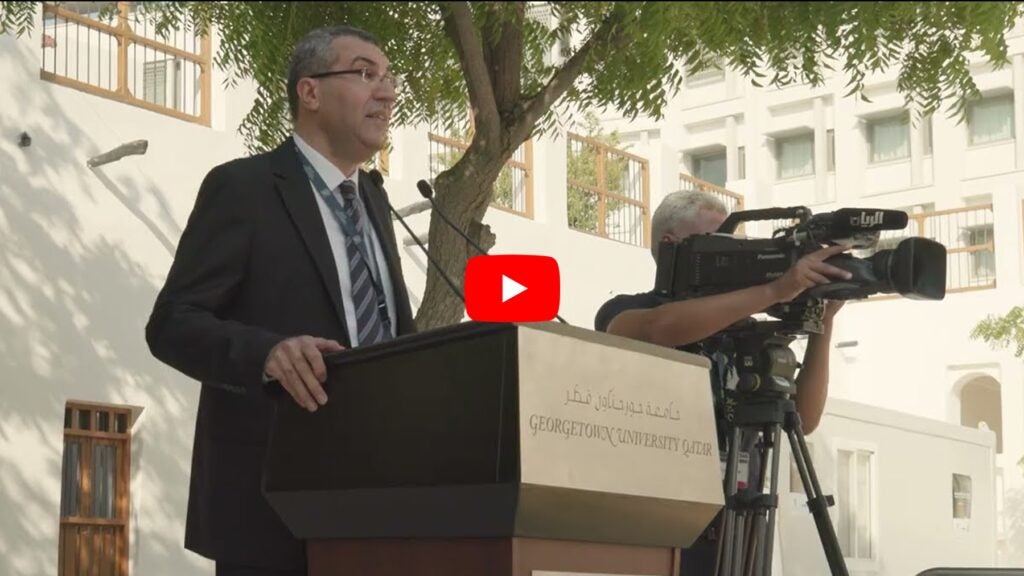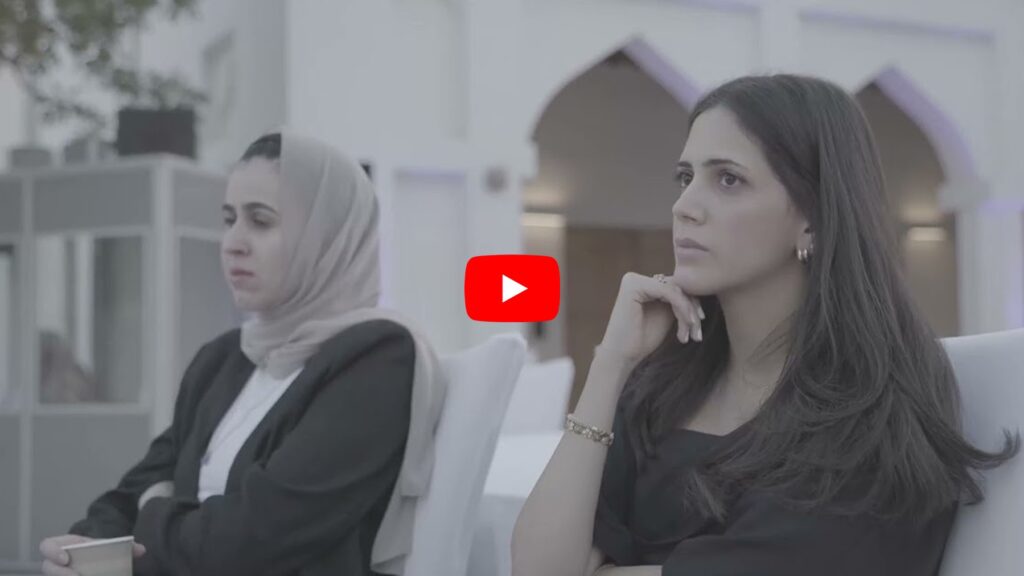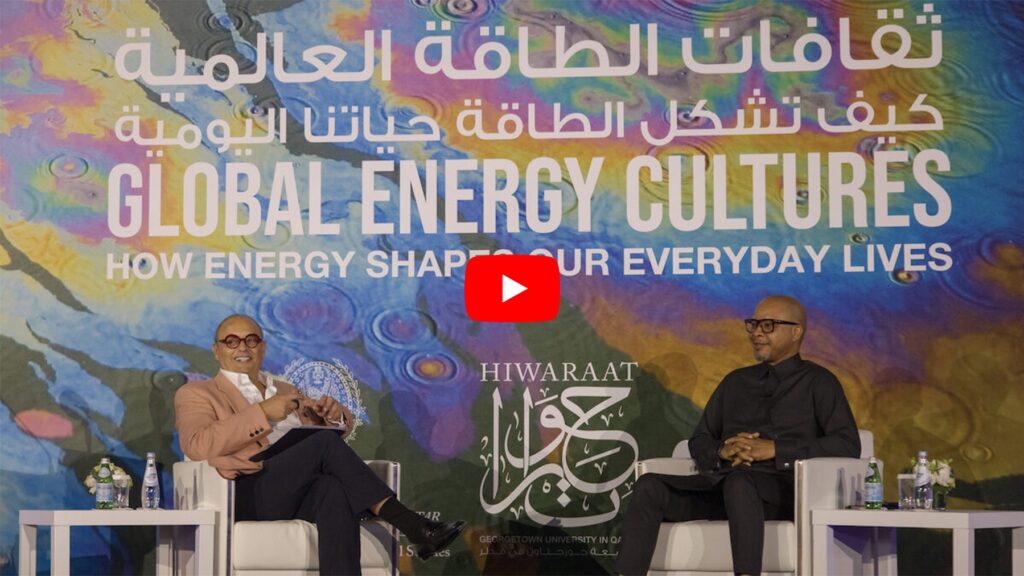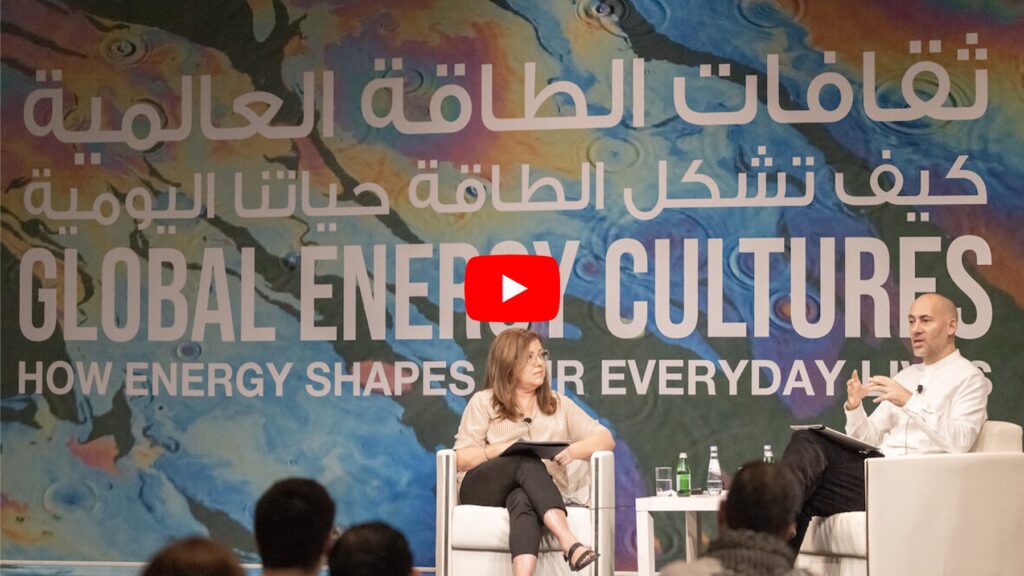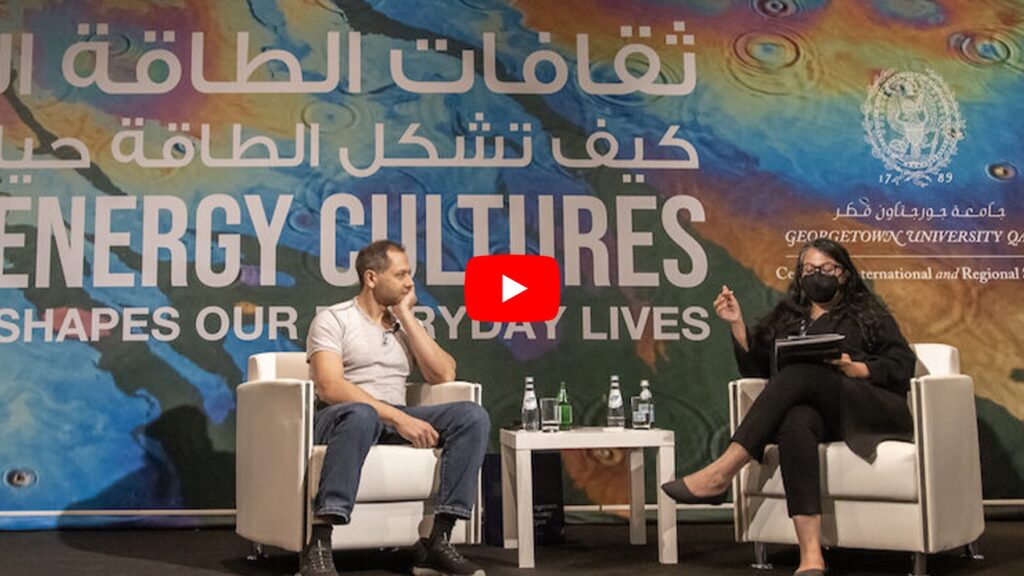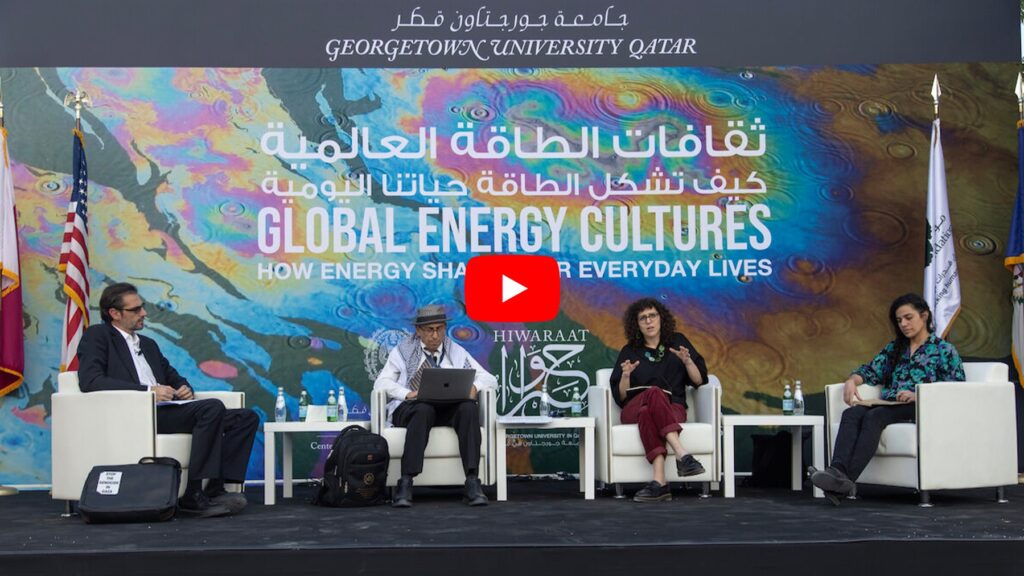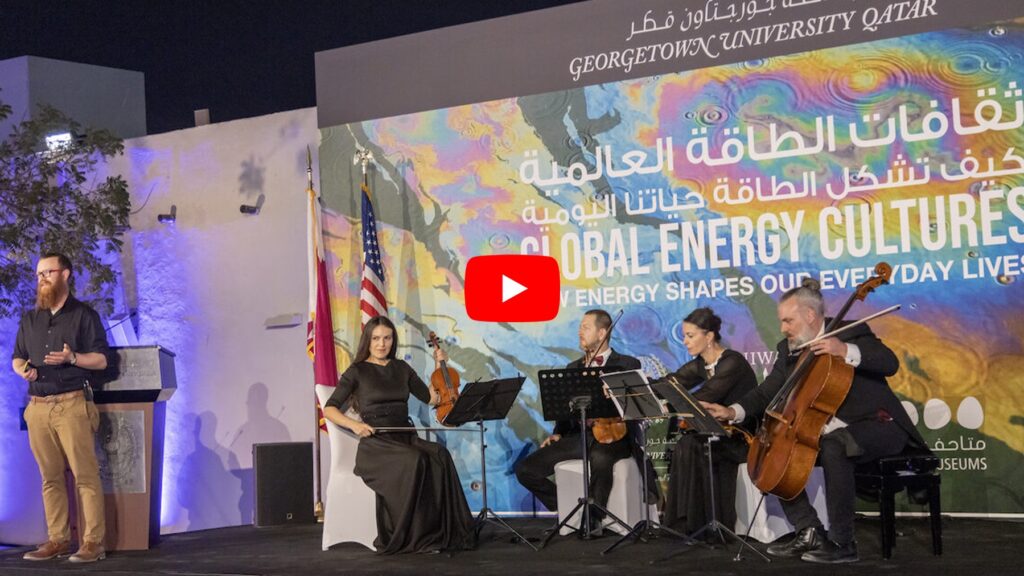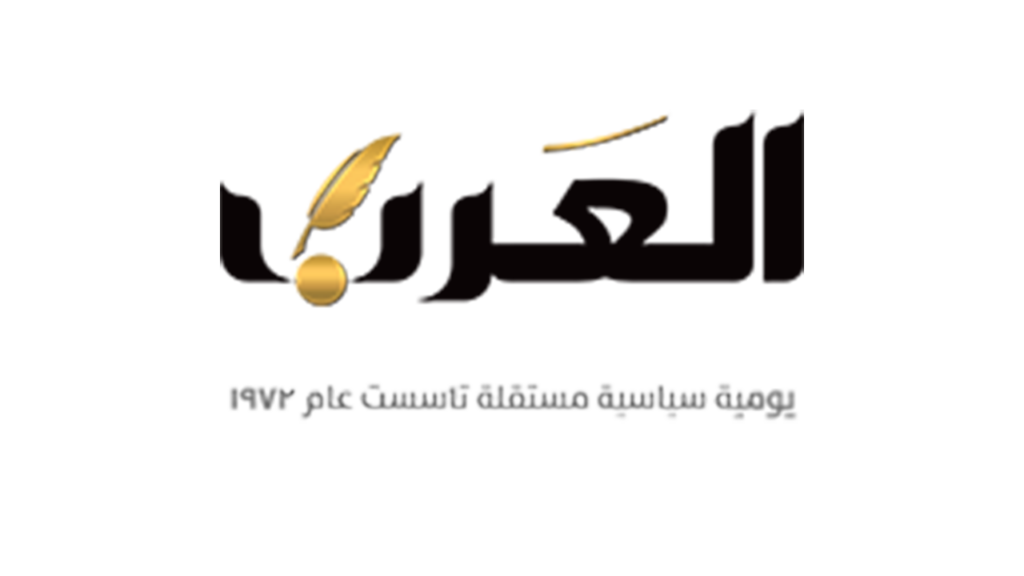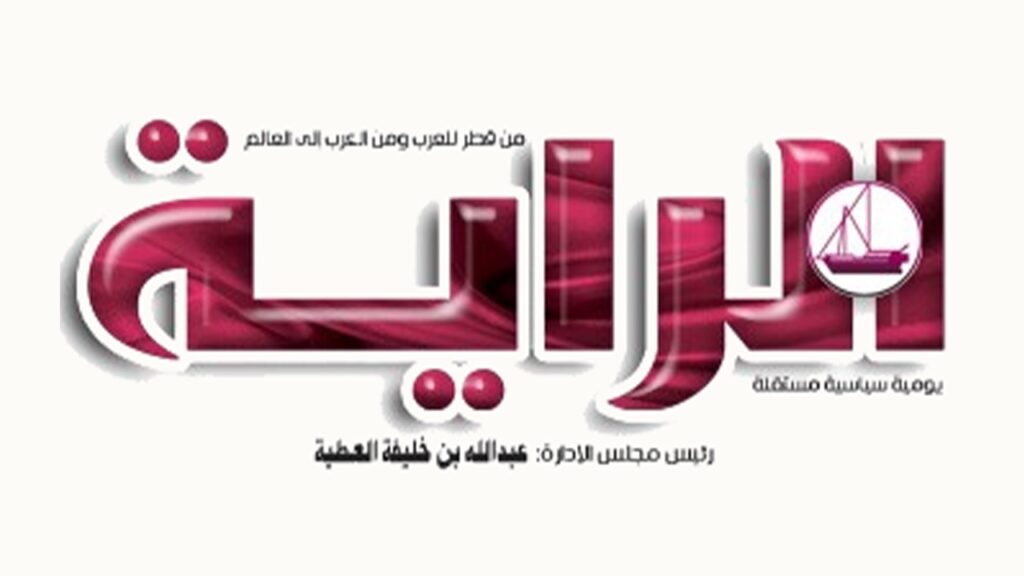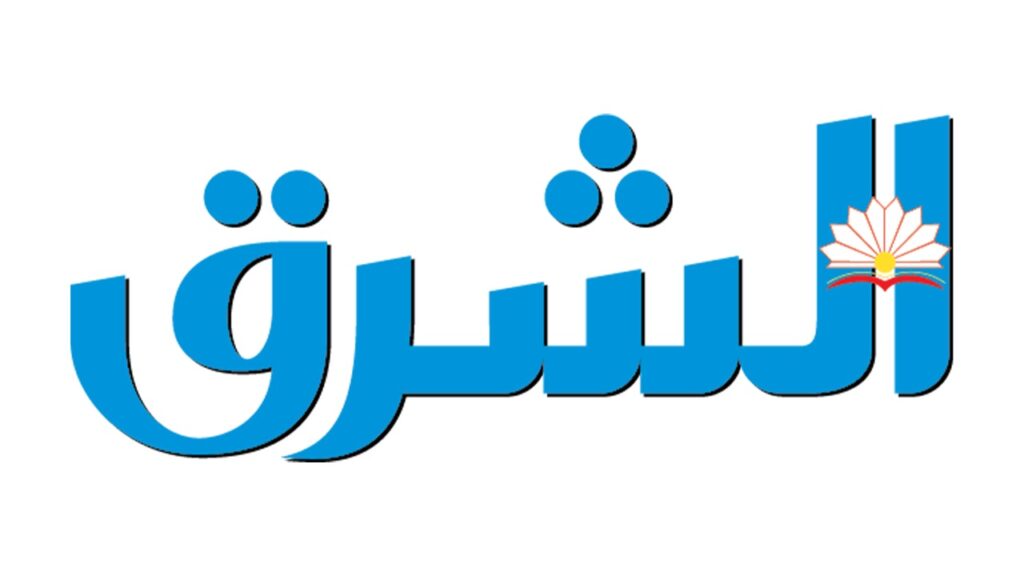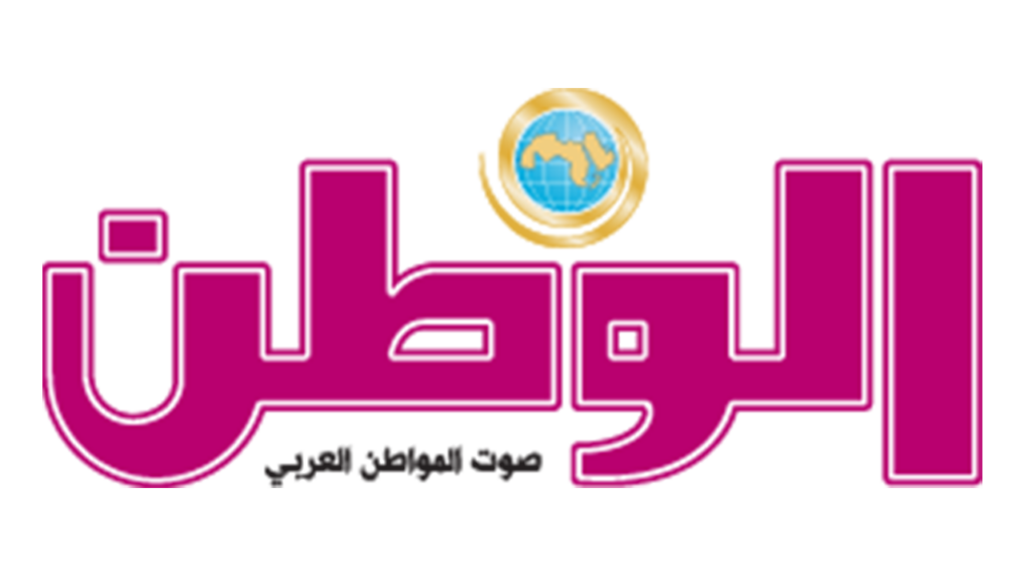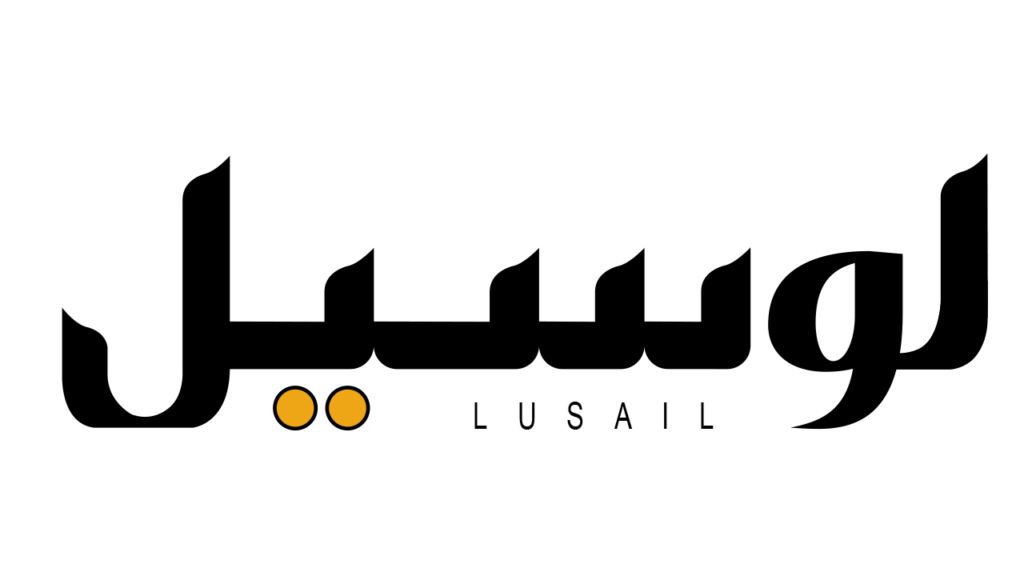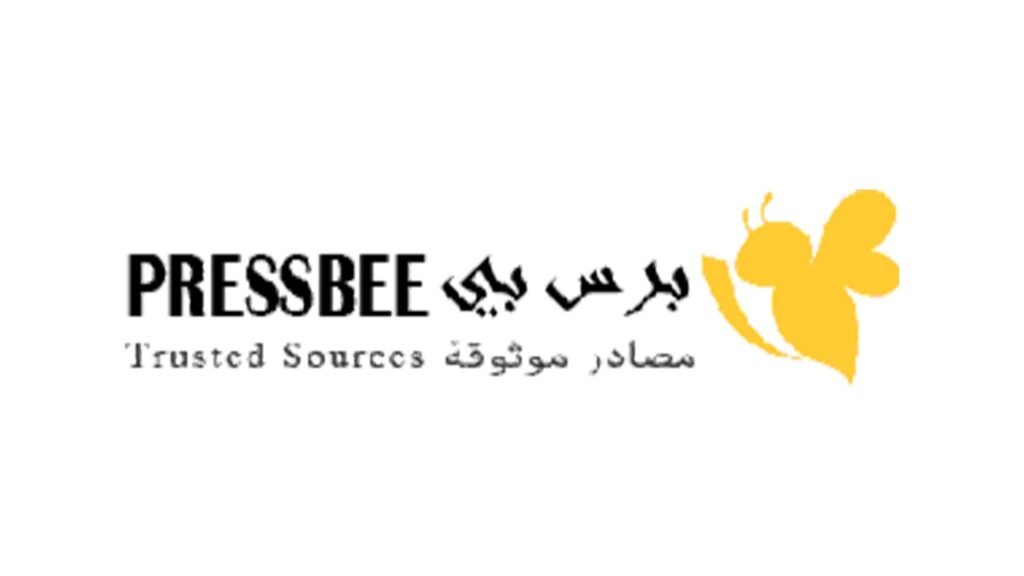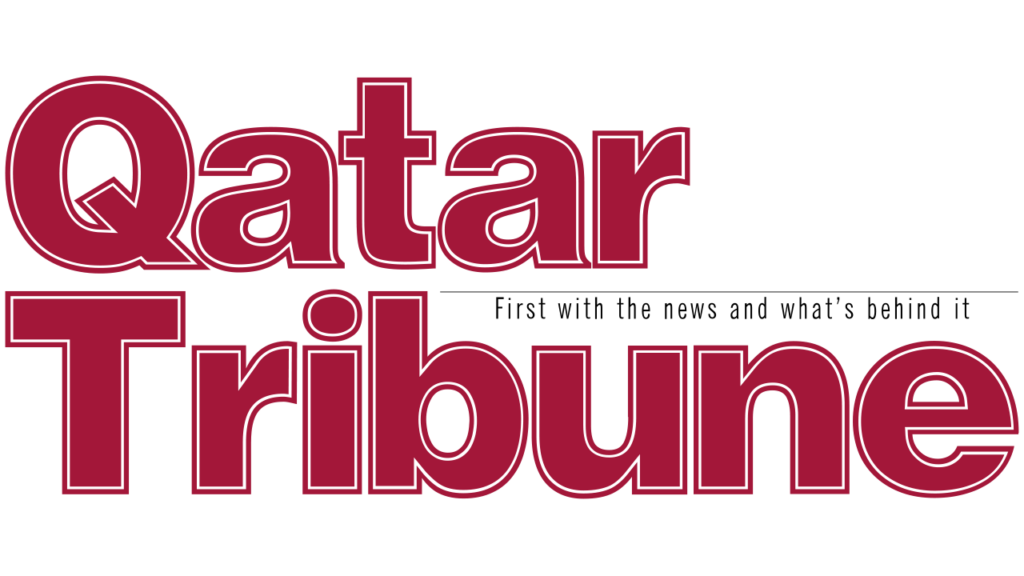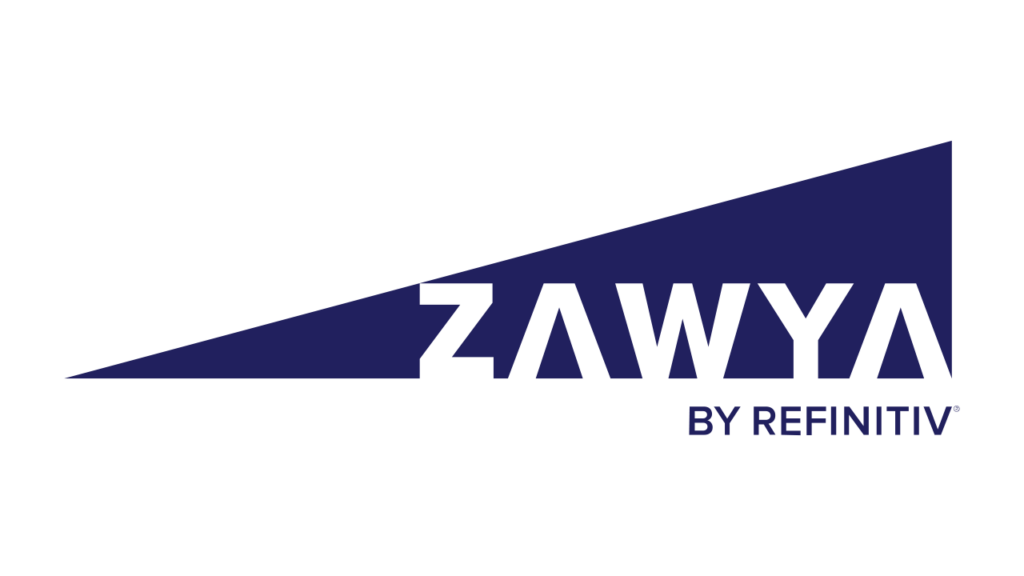Conference Highlights – Global Energy Cultures: How Energy Shapes Our Everyday Lives
HIWARAAT CONFERENCE SERIES
Global Energy Cultures: How Energy Shapes Our Everyday Lives
December 9-10, 2023
Aiming to unravel the threads that bind energy and our cultures and contribute to a future where sustainable practices take center stage, this conference, hosted by the Center for International and Regional Studies (CIRS) at GU-Q in collaboration with Msheireb Museums, offered a celebration of the intersection of art, activism, and scholarship about energy. Bringing together prominent scholars, policy advocates, artists, architects, writers, and activists from across the globe, this forum delved into energy’s societal, cultural, artistic, and historical impacts through history to underscore the pivotal role energy humanities plays in shaping a livable future. By understanding the socio-political dimensions of energy production and consumption, and its intersection with culture, this innovative forum empowered the imagination of just and equitable practices for energy systems around the world.
- 60 Speakers
- 270 Attendees
Day 1
Welcome and Opening
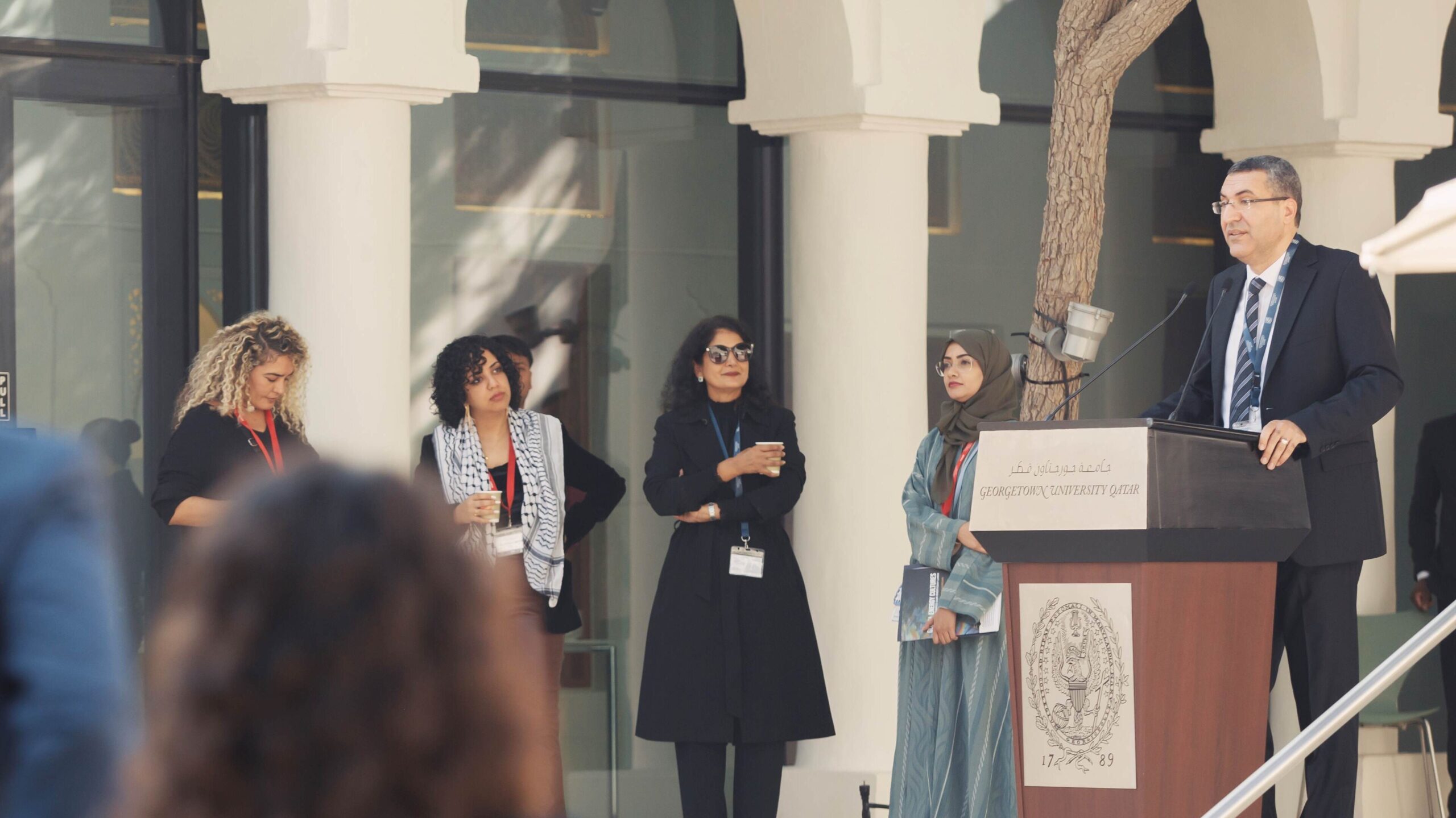
Firat Oruc, Associate Professor, GU-Q
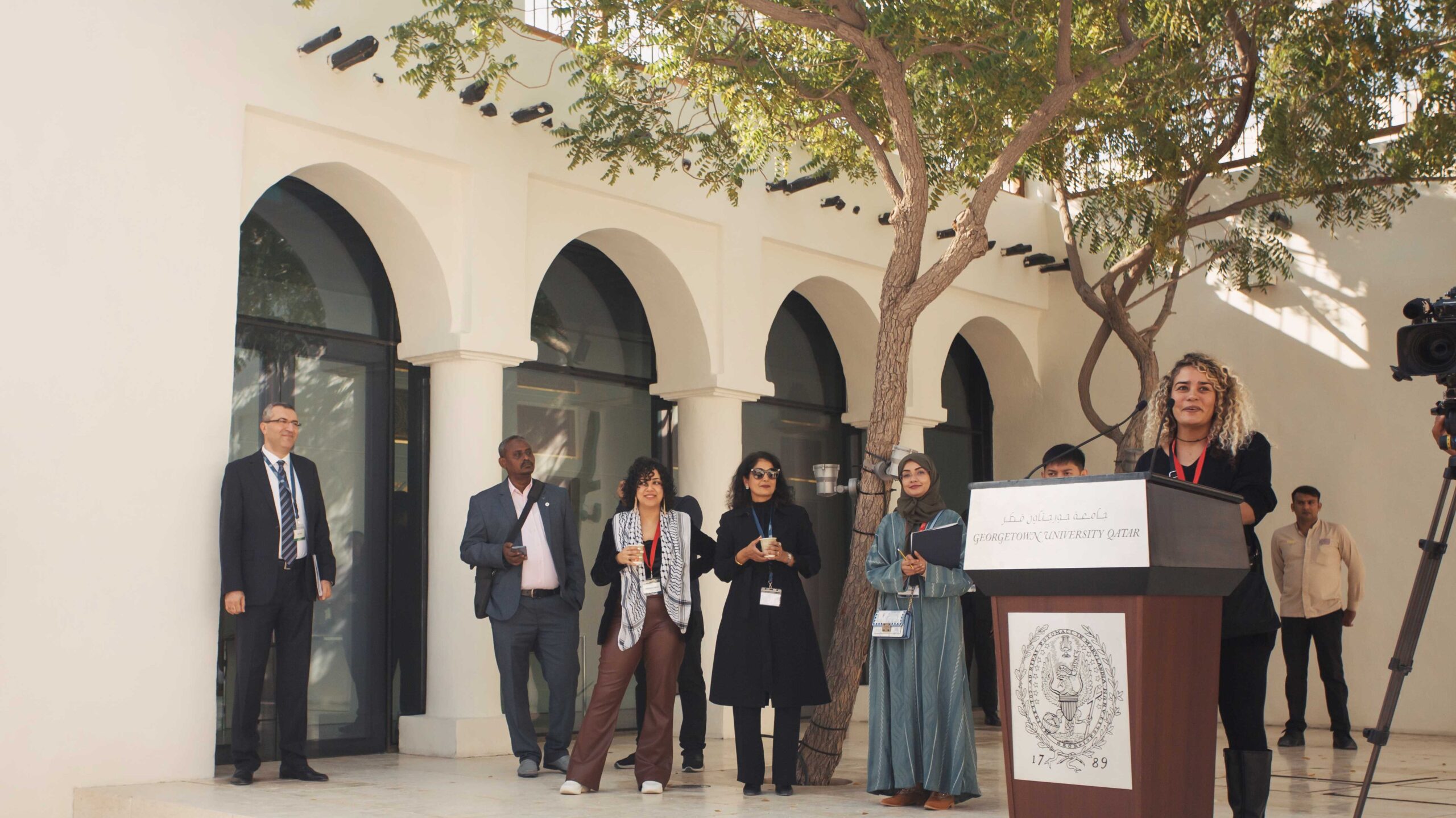
Suzi Mirgani, Associate Director of Publications, CIRS, GU-Q
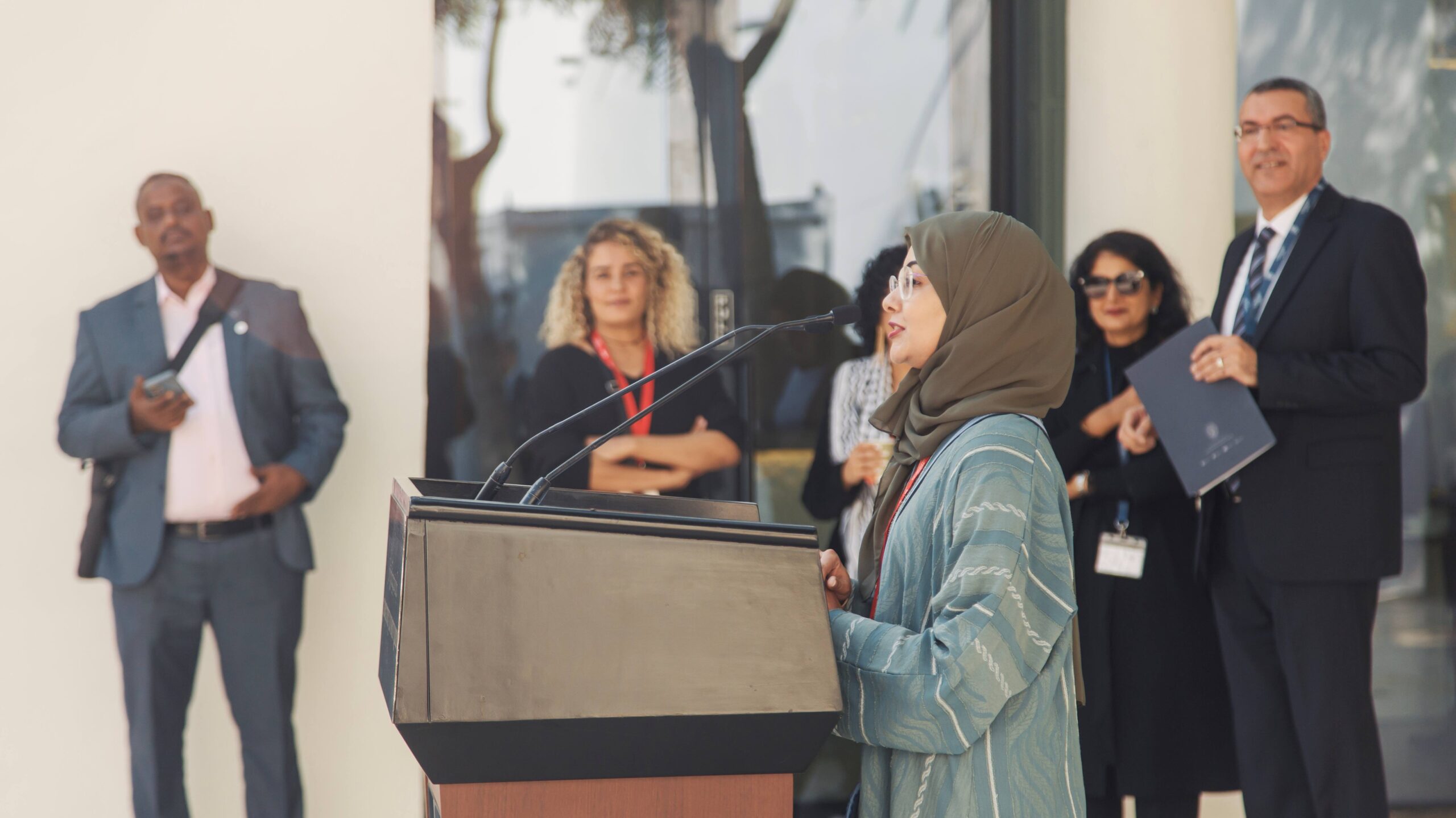
Misba BhatTi, Research ANALYST, CIRS, GU-Q
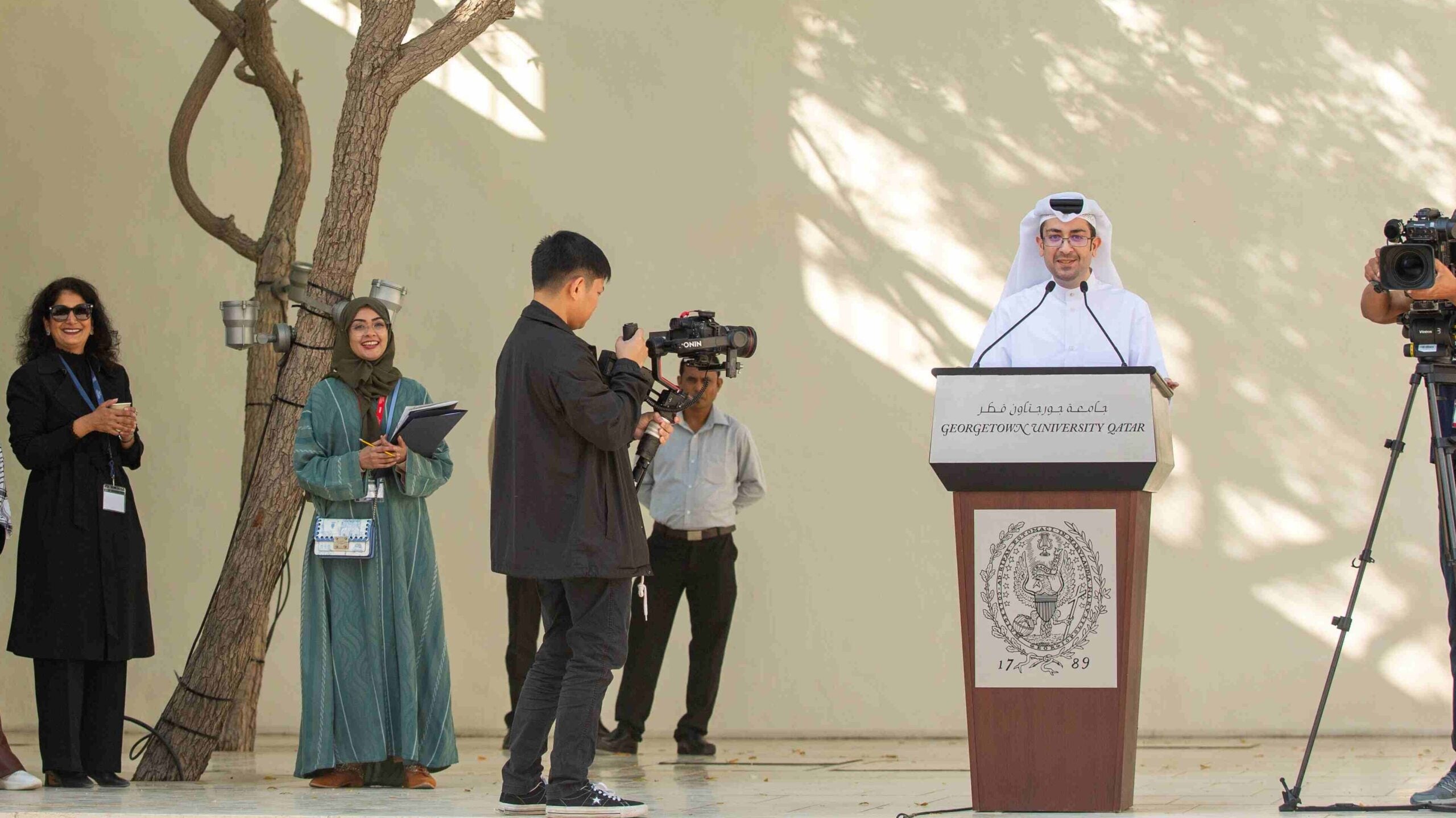
Abdullah Al Naama, Acting General Manager, Msheireb Museums
Keynote Conversation
Victor Ehikhamenor is a Nigerian-American multidisciplinary visual artist and writer known for his vibrant and incisive works that engage with African cultural heritage, its resonance within the global African diaspora, and the postcolonial politics of his native Nigeria.
In this engaging discussion featuring Dean Safwan Masri in conversation with GU-Q Artist-in-Residence Victor Ehikhamenor, the artist discussed the artwork he created for the conference titled For Those Who Slept in the Dark with Identifiable Ghosts, the importance of history and context in artmaking, and the transformative power of sharing truth.
“Energy is the essence of every aspect of life: science, technology, communications, economy. Its significance goes beyond the physical and extends to culture and society. It guides our understanding of the world and binds human communities while driving collaboration as well as conflict. This conference takes energy in all its representations as its main theme, proposing to reflect on the profound, manifold meanings of energy and our changing relationships with it as we strive for equity and sustainability.”
–Dean Safwan Masri
“We humans, whatever we touch, we exchange energy in them. From that perspective, what is the intersection between energy and culture? There’s one thing that ties all of us together is that energy is necessary, and it’s not something we can ignore, whether human energy or electrical energy or any other form…We need to begin to embrace peace as much as possible. In the same way, people who believe in war are very vigorous in their advocacy for war, we need the same level of energy to ask for peace.”
–Victor Ehikhamenor
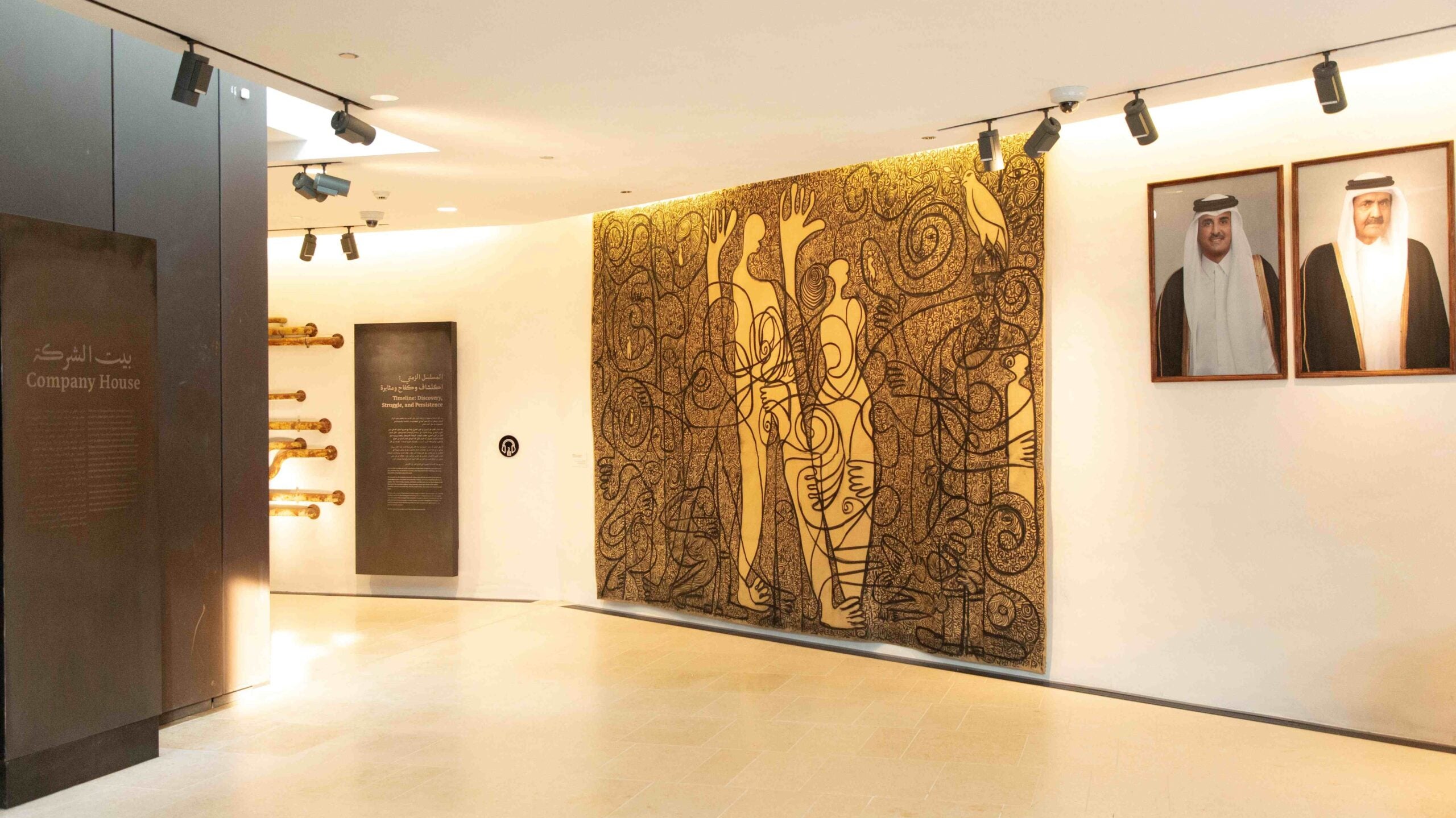
For Those Who Slept in the Dark with Identifiable Ghosts by Victor Ehikhamenor, produced at GU-Q during Artist-in-Residence
Concurrent Sessions
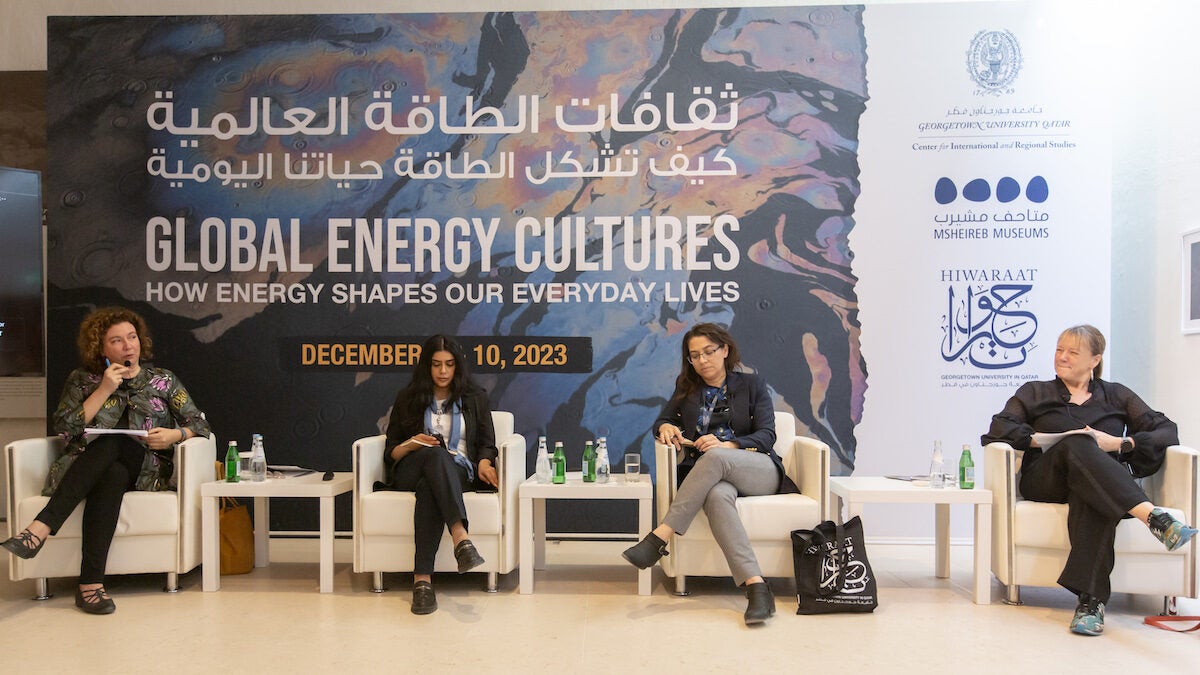
Everywhere Invisible: Household Energy Use
Moderated by Maryam Al Sada, GU-Q, this panel discussed how everyday household energy practices and gender roles relate to larger scale power systems, including global inequalities.
Panelists:
Marwa Koheji, New York University Abu Dhabi
Diana Montaño, Washington University in St. Louis
Abigail Harrison Moore, University of Leeds
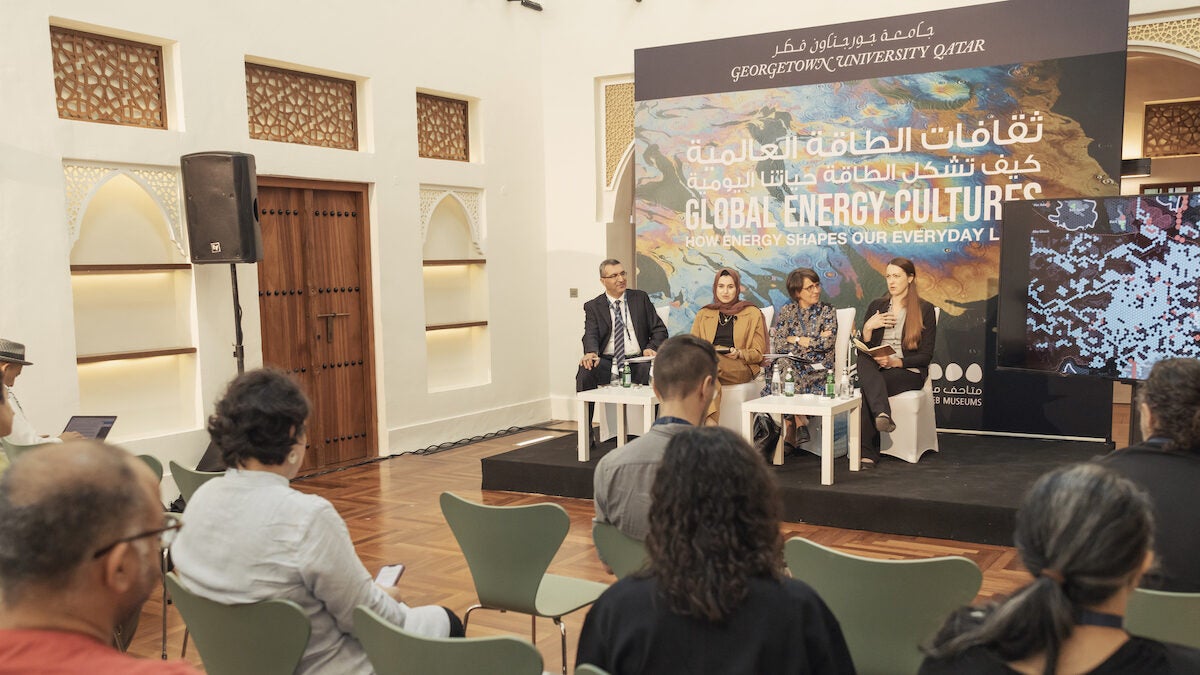
Energyscapes: Putting Energy in Place
On this panel, moderated by Firat Oruc, GU-Q, three scholars explored how energy makes space and place, offering new insights into the histories, presents, and futures of places through the lens of energy.
Panelists:
Jumanah Abbas, Qatar Museums
Nelida Fuccaro, New York University Abu Dhabi
Natalie Koch, Syracuse University
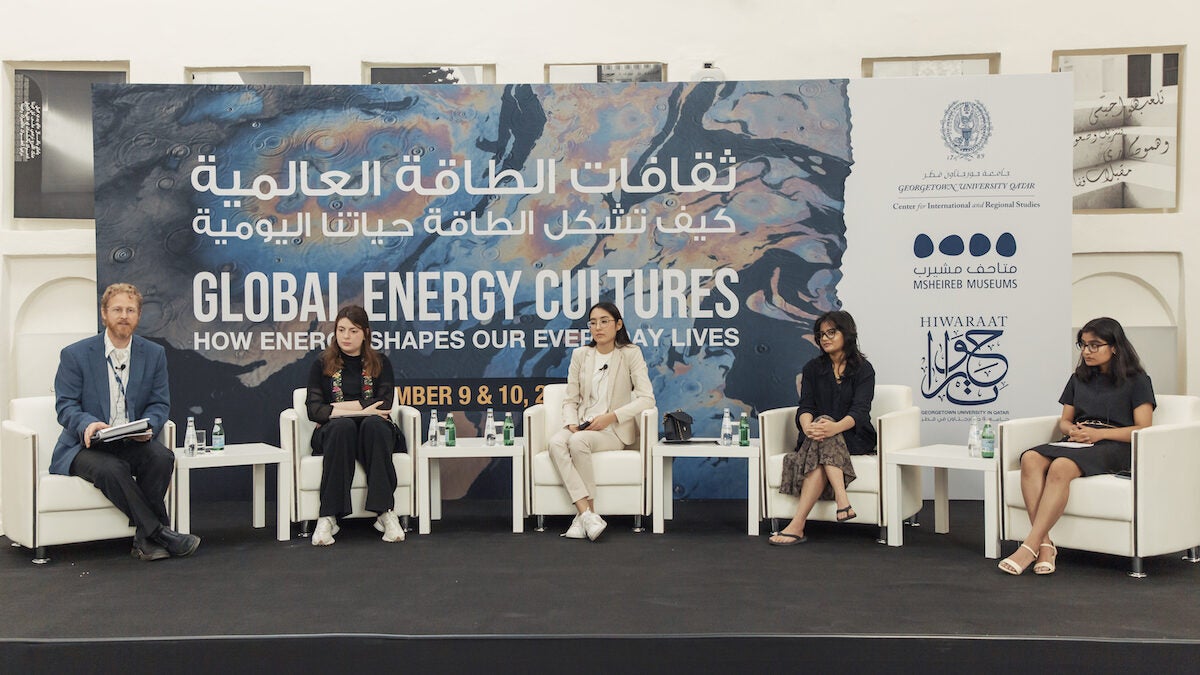
Youth Voices for Sustainable Futures
Moderated by James Olsen, GU-Q this panel talked to four student-activists from GU-Q and Northwestern Qatar, about how they are envisioning and working towards a sustainble future.
Panelists:
Zaina Khalil, GU-Q
Raikhan Primbetova, GU-Q
Sarah Shamim, Northwestern Qatar
Shikoh Zaidi, GU-Q
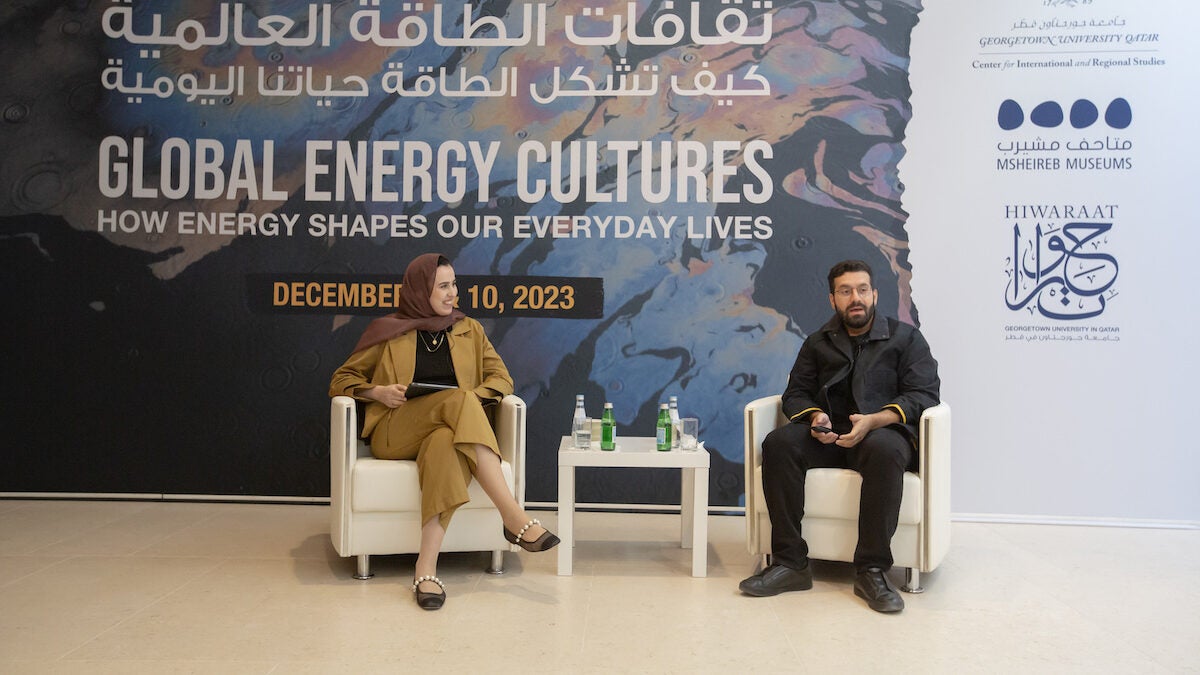
Artist Talk and Exhibition: Civil Architecture
Jumanah Abbas, Qatar Museums held a talk with Ali Karimi, Artist and Architect, Civil Architecture, about his exhibition at Msheireb Museums featuring eight recent projects by the practice that engage with issues related to ecology, extraction, and the landscapes of the Gulf.
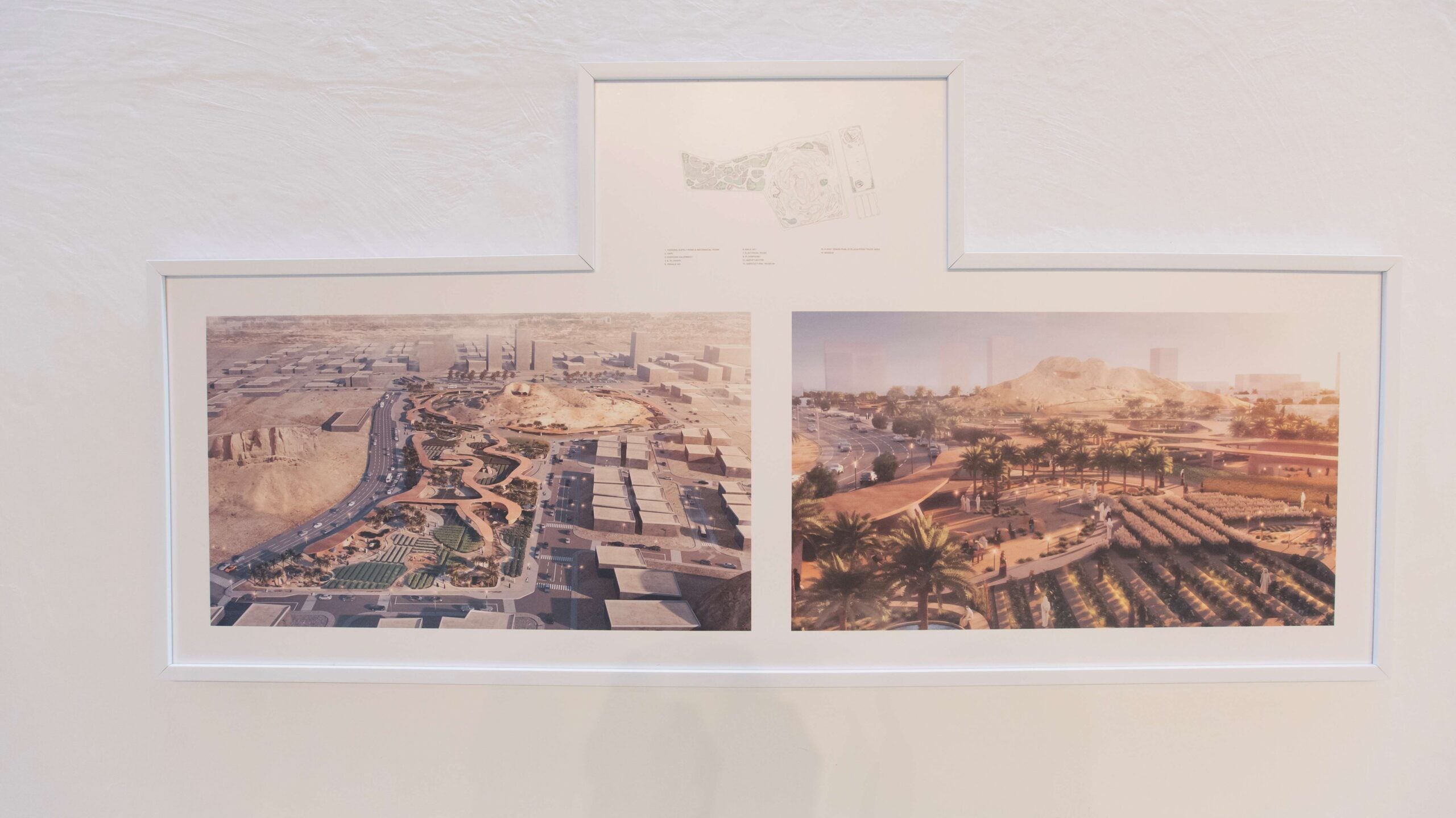
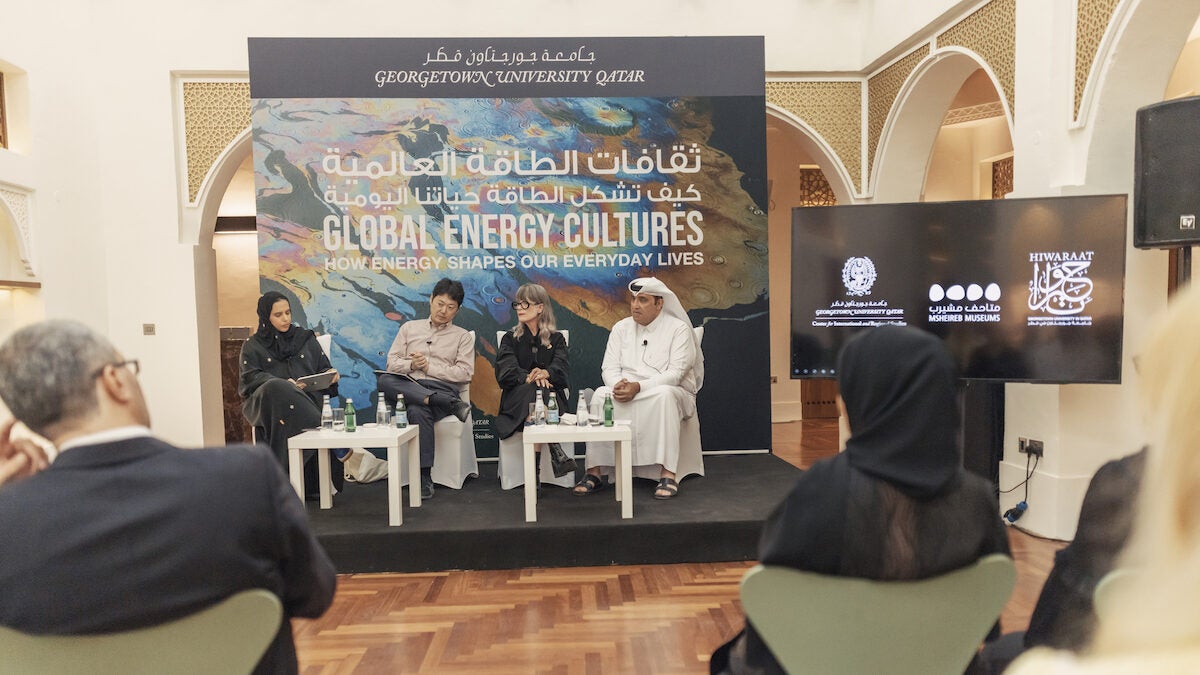
Heritage Spaces and Energy Futures
This panel moderated by Nouf Al-Thani, GU-Q explores heritage sites as a source of knowledge for a secure energy future, including best practices of applying alternatives forms of solar, wind, geothermal energy, and bioenergy in architectural heritage spaces.
Panelists:
Hafiz Ali Abdulla, Msheireb Properties
Astrid Kensinger, VCUarts Qatar
Hiroki Shin, Queen’s University Belfast
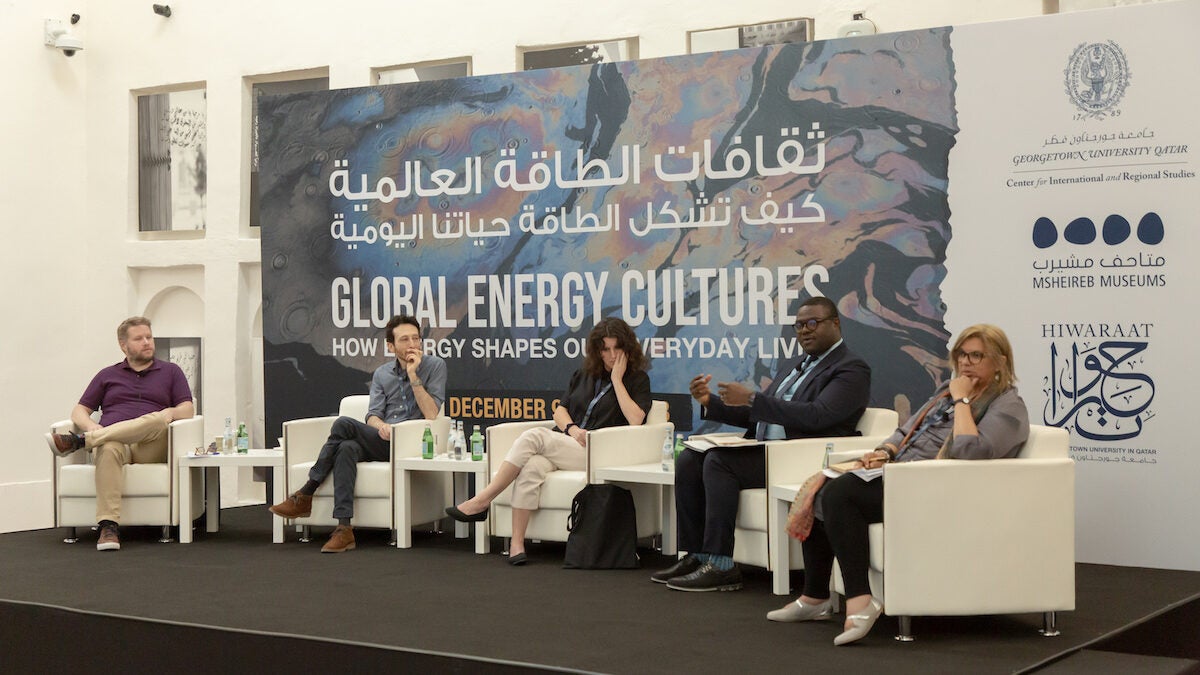
Energy Africa: Past, Present, Future
Moderated by James Hodapp, Northwestern Qatar, this panel discussed Africa’s energy and electrical history, their present conditions, and challenges of energy transitions in the future, focusing on cross-cutting themes and issues in Nigeria, Tanzania, and South Africa.
Panelists:
Michael Degani, University of Cambridge
Veronica Jacome, Temple University
Damilola Olawuyi, Hamad Bin Khalifa University
Michelle Pressend, University of Capetown
Art Activity and Discussion: The Search for Power
In this discussion moderated by Katia Arfara, NYU Abu Dhabi, Ziad Abu Rish, Bard College discusses his experiential exhibition about the history of power outages in Lebanon, created with his partner, artist Tania El Khoury. The sound instillation, The Search for Power, is an art activity and lecture performance featuring El Khoury, Abu Rish, and the audience, which delves into the intersection between public utilities infrastructure, people’s relationship to the state, and various popular mobilizations to shape both.
“It was a real challenge to think about what does it mean to actually engage the audience of your research in an interactive way. On the other hand, there’s a whole archival turn…in the art world…So we’re kind of playing with both, how academics are thinking about public scholarship, but also how the art world is engagingwith the archival turn on that front.”
– Ziad Abu Rish
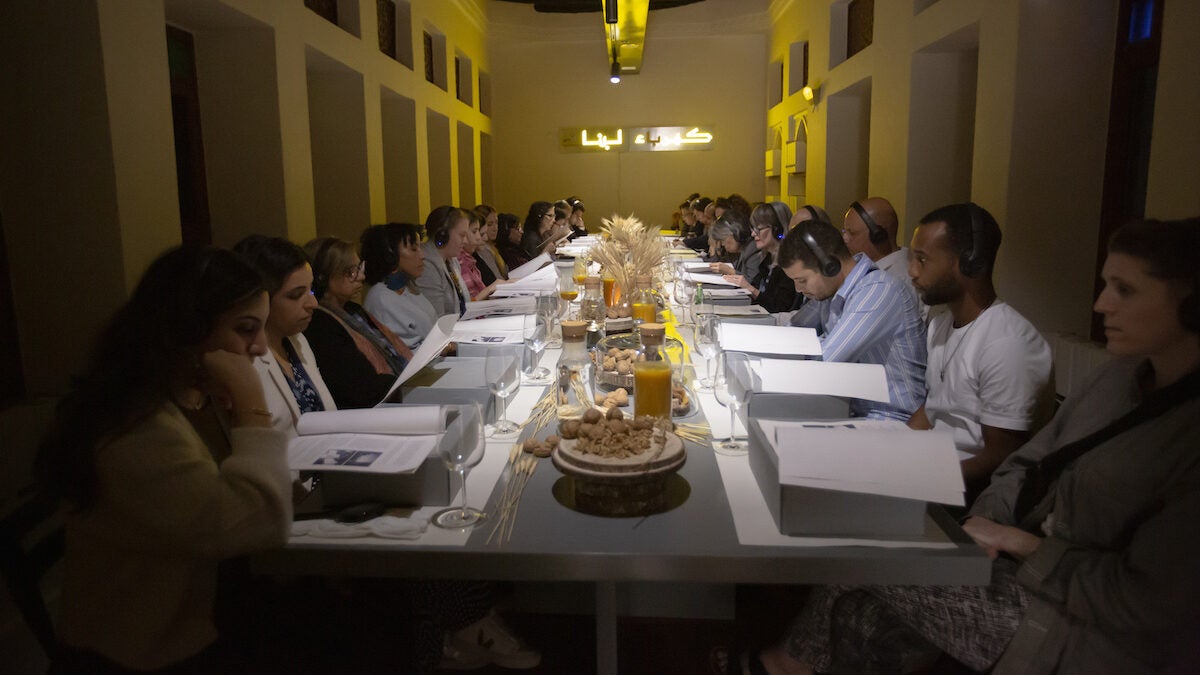
The Art Activity engaged conference participants in the overwhelming task of reviewing and making decisions on vast amounts of archival material concerning power outages in Lebanon.
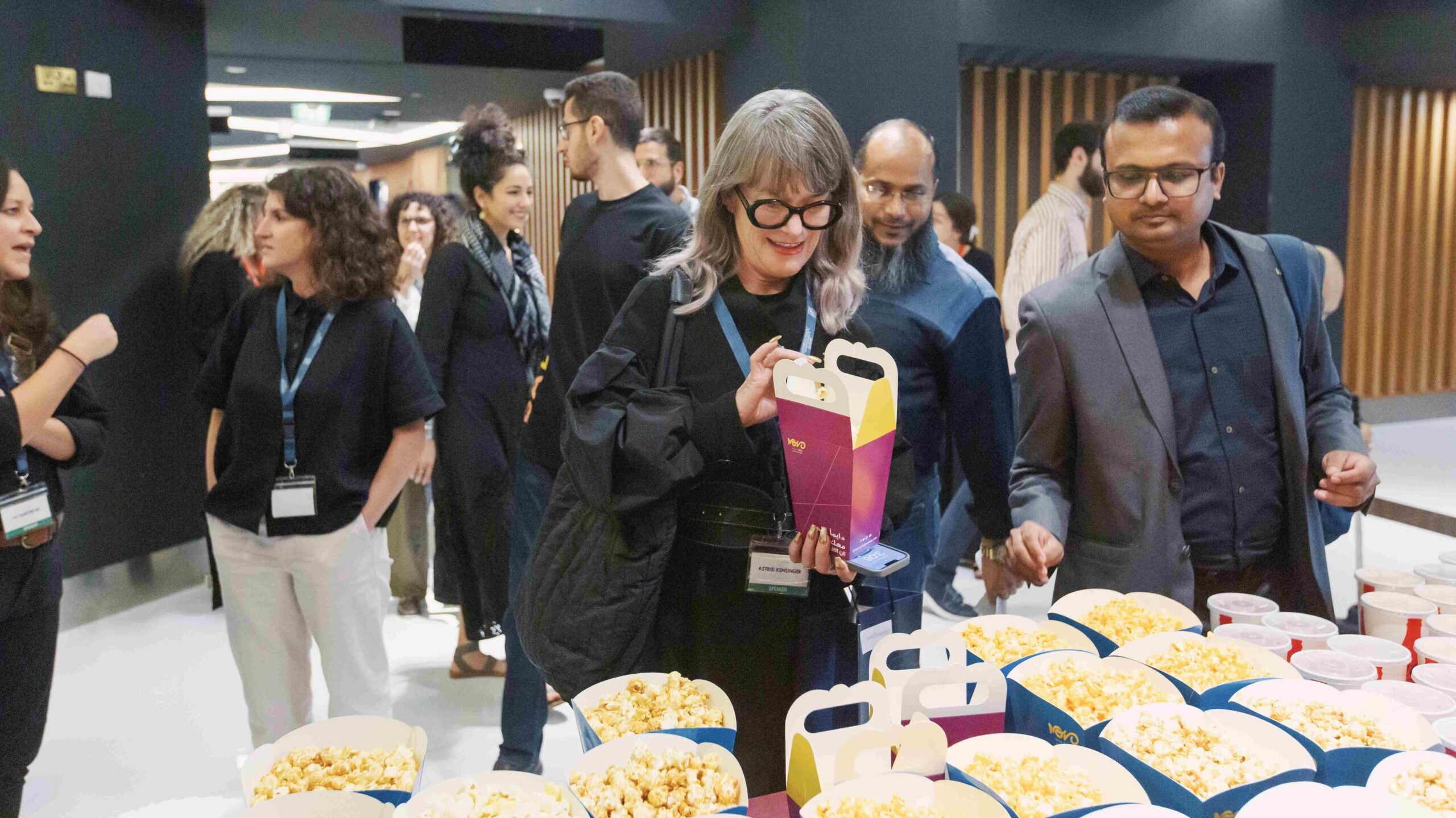
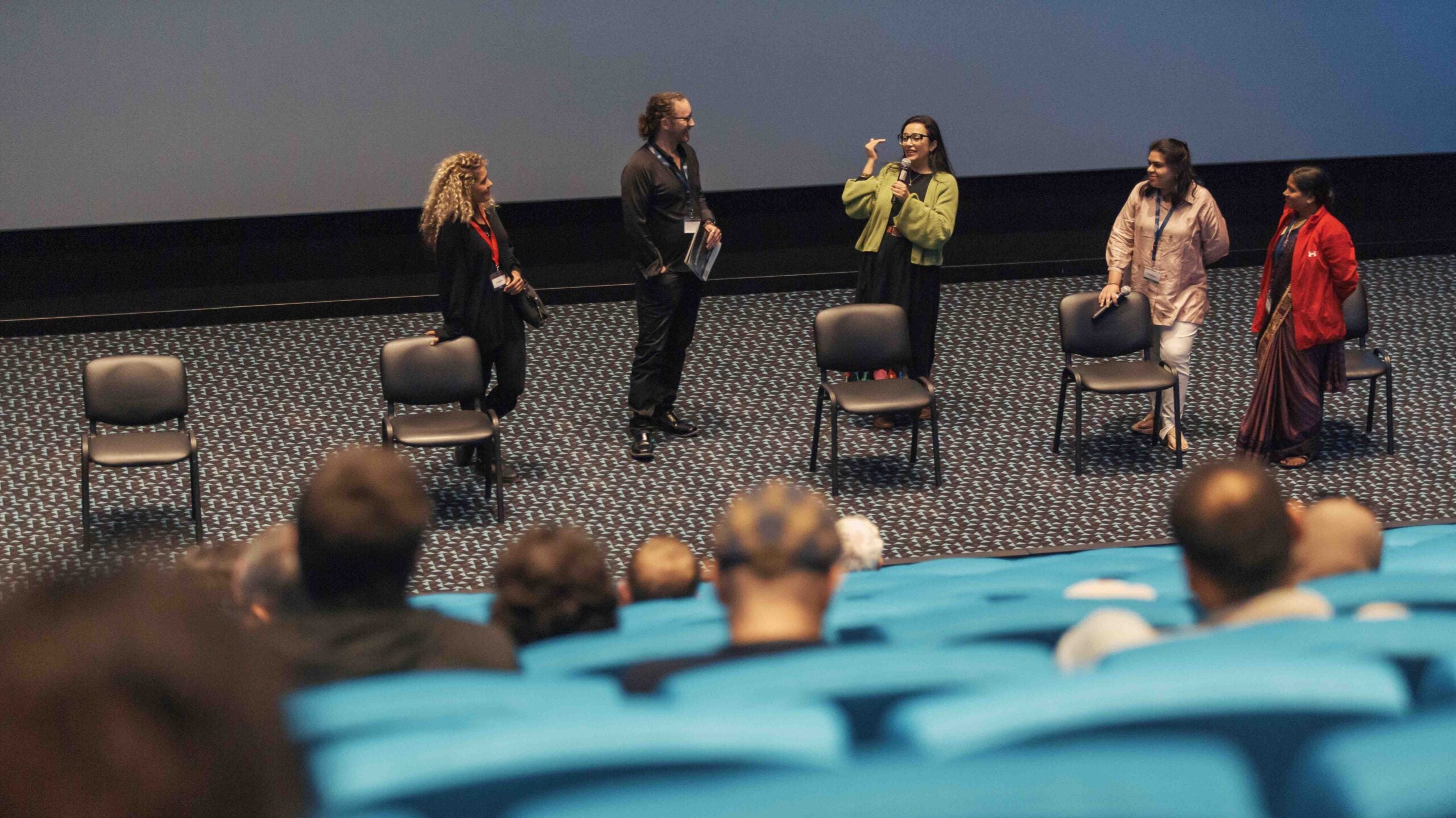
Energy on Screen: Short Film Program
This film screening featured seven short films exploring different aspects of climate change and activism. Following the film program, Dale Hudson, New York University Abu Dhabi, moderated a discussion with the filmakers about the art of storytelling and the ways in which film can inspire change, action, and accountability.
Panelists
Bassam Alasad & Abeer Bayazidi, Greener Screen
Lakshmi Sharma & Srishti Mehra, Chambal Media
Suzi Mirgani, CIRS, GU-Q
Films Shown
Finding Oum Al Ghaith
(Documentary, 36 mins, 2023, Jordan) Bassam Alasad and Abeer Bayazidi. Three women in a drought land before winter solace, contrasting ancient rainmaking rituals and echoing it at the same time while leading their community to save and restore water resources.
Berta Didn’t Die, She Multiplied
(10 min, 2017, USA) Sam Vinal. In Honduras, the most dangerous country in the world to be a land defender, Berta Cáceres’ death has not silenced the many camps fighting for justice and Indigenous Sovereignty. They mourn Berta’s assassination with powerful chants of “Berta Didn’t Die, She Multiplied!”
Canary
(Animation, 12 mins, 2022, Canada) Pierre-Hugues Dallaire and Benoit Therriault. Canary birds are highly sensitive to their environments, often used in mining as an indicator to see if the air was safe to breathe. Young Sonny doesn’t like mining much, and he trains his pet canary to play dead so they can take the day off. A prank that leads to unintentional disaster.
“The Sky Oscillates Between Eternity and Its Immediate Consequences”
(Experimental, 18 mins, 2021, Lebanon) Nadim Choufi. Two protagonists express their desires and the limitations of pursuing them as they live in a vision of a perfect city.
Virtual Voice
(7 mins, 2021, Sudan/Qatar) Suzi Mirgani. This is a satirical review of our times. A self-righteous rant against sources of power. Suzi doll is an ego-warrior, marching to the algorithms of social media.
Bottle Cap
(Animation, 5 mins, 2022, USA) Marie Hyon and Marco Spier. Claw-size matters to a fiddler crab, so when a plastic bottle cap stands in for Shelton’s worthless digging claw, he feels powerful, but this kind of glory will come at a horrible cost.
Now You See Us, Now You Don’t
(12 mins, 2021, India) Lakshmi Sharma and Megha Acharya. This documentary examines how factors like gender, caste, religion, and land ownership determine one’s vulnerability to climate change, and especially floods, in India.
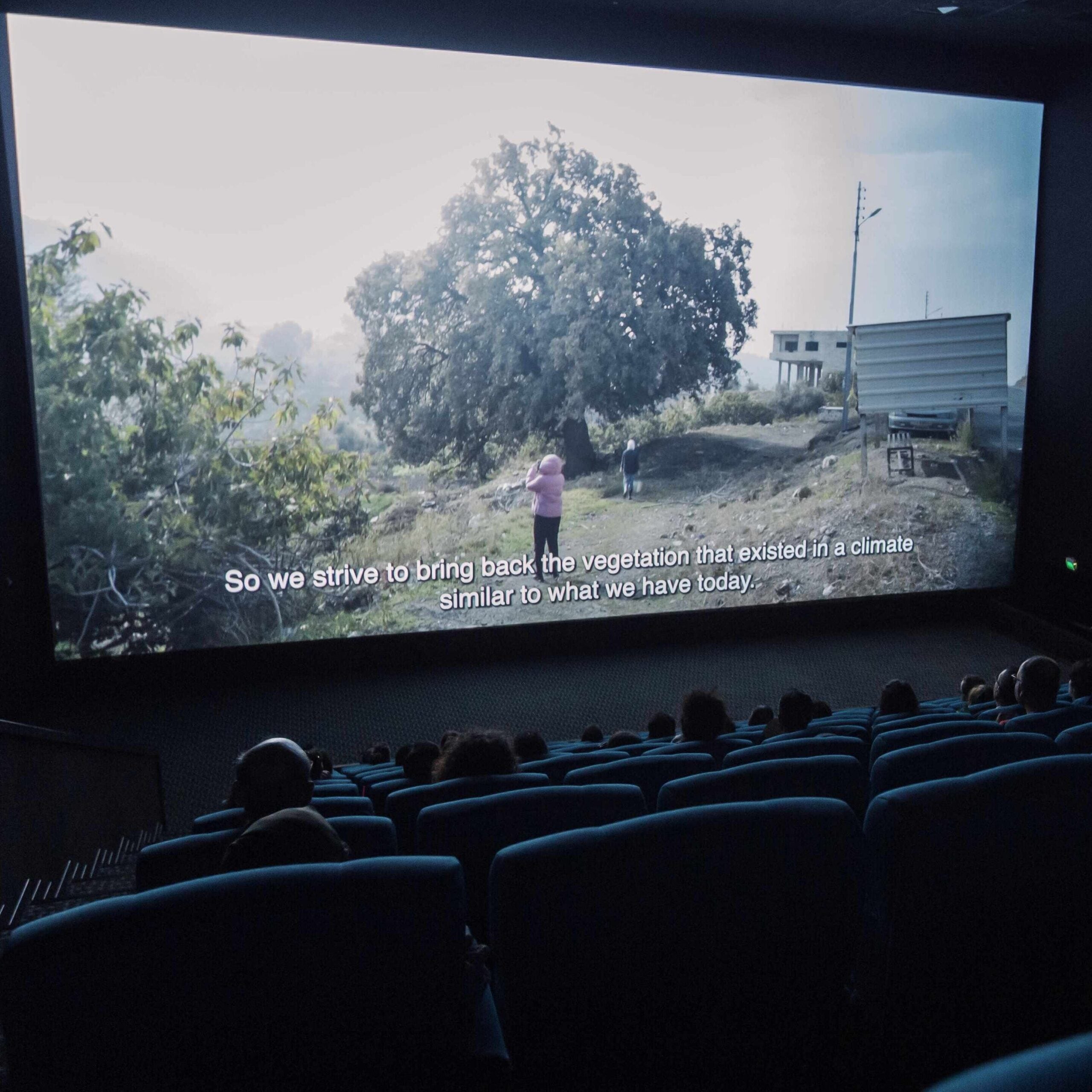
Day 2
Artist Talk: In Conversation with Omar El Akkad
This discussion moderated by Sheetal Majithia, New York University Abu Dhabi featured Omar El Akkad, journalist and author, talking about the way the Global North understands their role in suffering around the world, and the importance of telling stories that retell dominant narratives. His first book, The American War (2017) explores a future America ravaged by climate change and engaged in a civil war fought over energy, and What Strange Paradise (2021) which reimagines Peter Pan as a refugee.
“I thought about this idea of taking the conflicts that have defined the world in my lifetime…these are conflicts in which…US involvement specifically has been either from a great distance or sort of indirect, and to recast it as close to home as I could think of… a civil war where you’re fighting yourself. The idea being to talk about this notion that there’s no such thing as an exotic kind of suffering…And then the second novel What Strange Paradise, is the story of Peter Pan reinterpreted as a story of contemporary child refugee…trying to take a comforting fairytale that Westerners had been telling their kids for the last hundred years and repurposing it to tell a different kind of story.”
– Omar El Akkad
Concurrent Sessions
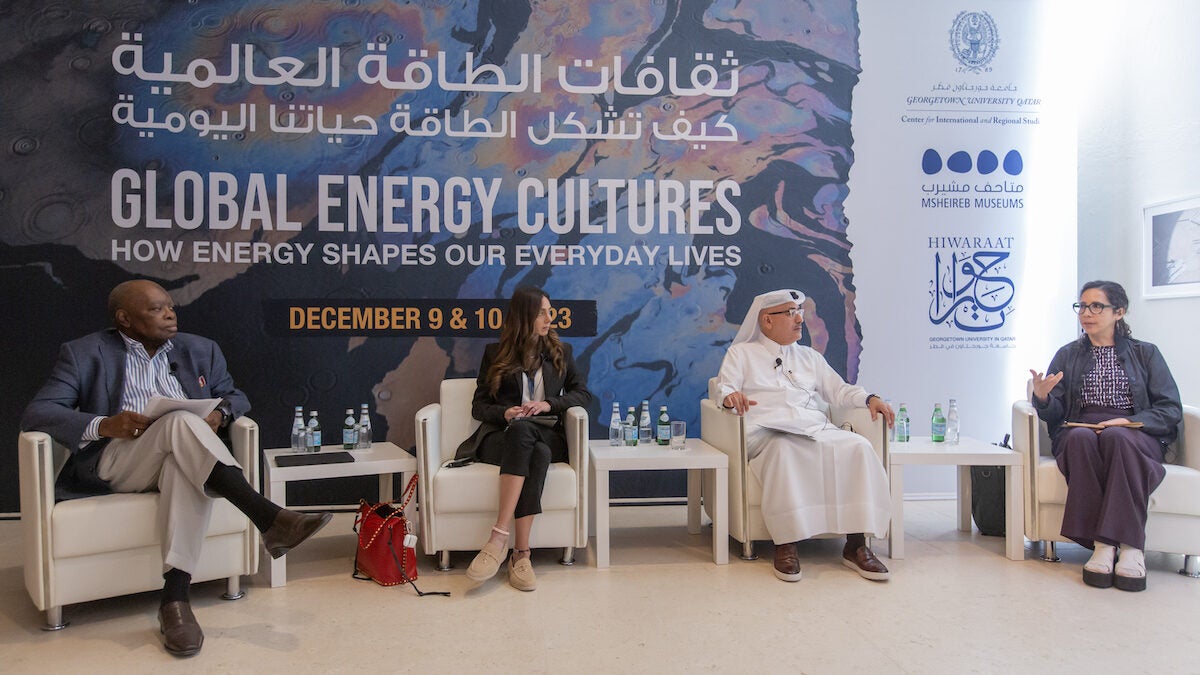
Architecture and Energy: Dialogue with Practitioners
Moderated by Akel Kahera, HBKU, this dialogue engaged architecture practitioners in a discussion on how architecture and urban planning shapes our day-to-day relationship with energy.
Panelists:
Noor Abdelmageed, The Royal Commission for AlUla
Ibrahim Jaidah, Arab Engineering Bureau
Penélope Plaza, University of Reading
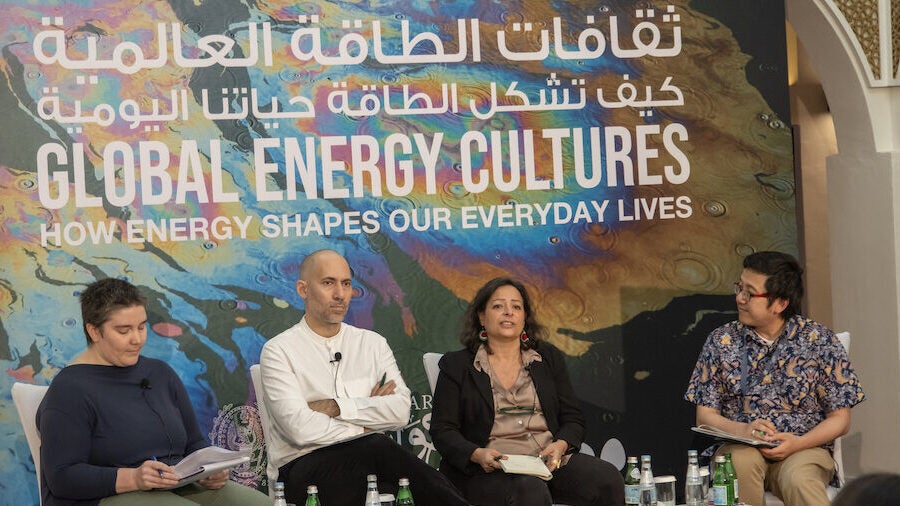
Energy and Democracy
This panel moderated by Trish Kahle, GU-Q, looked at how energy has shaped modern statecraft, democratic movements, and economic transformations, drawing from history to discuss the future of democracy.
Panelists:
Ziad Abu-Rish, Bard College
Laleh Khalili, University of Exeter
Victor Seow, Harvard University
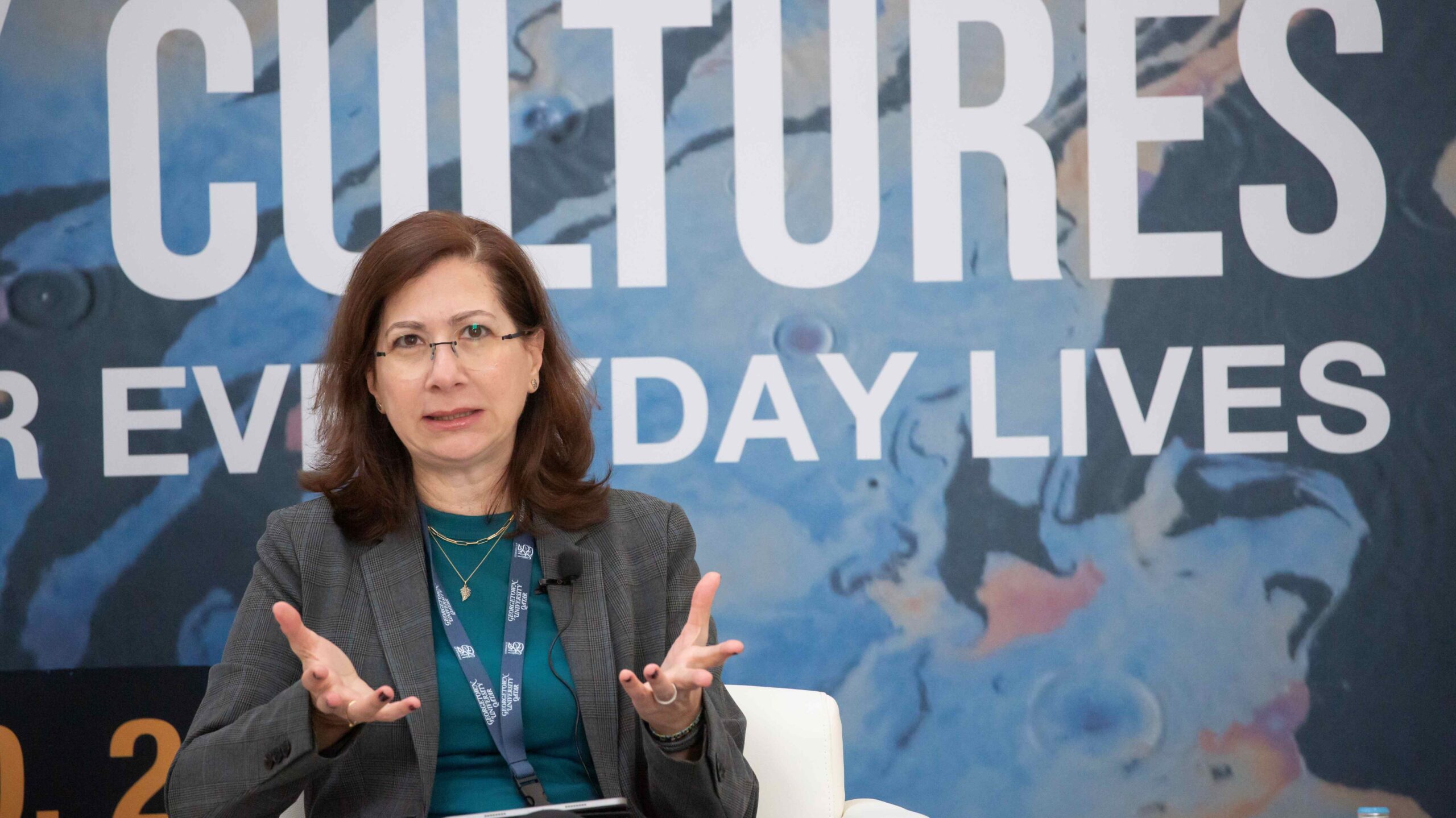
Resilience and Maintenance: Energy and Urban Infrastructures
Moderated by Anto Mohsin, Northwestern Qatar, this panel examined urban resilience and infrastructure maintenance in the context of energy production and consumption.
Panelists:
Sulfikar Amir, Nanyang Technological University
Mona Harb, American University of Beirut
Cecilia Ibarra, University of Chile
Veronica Jacome, Temple University
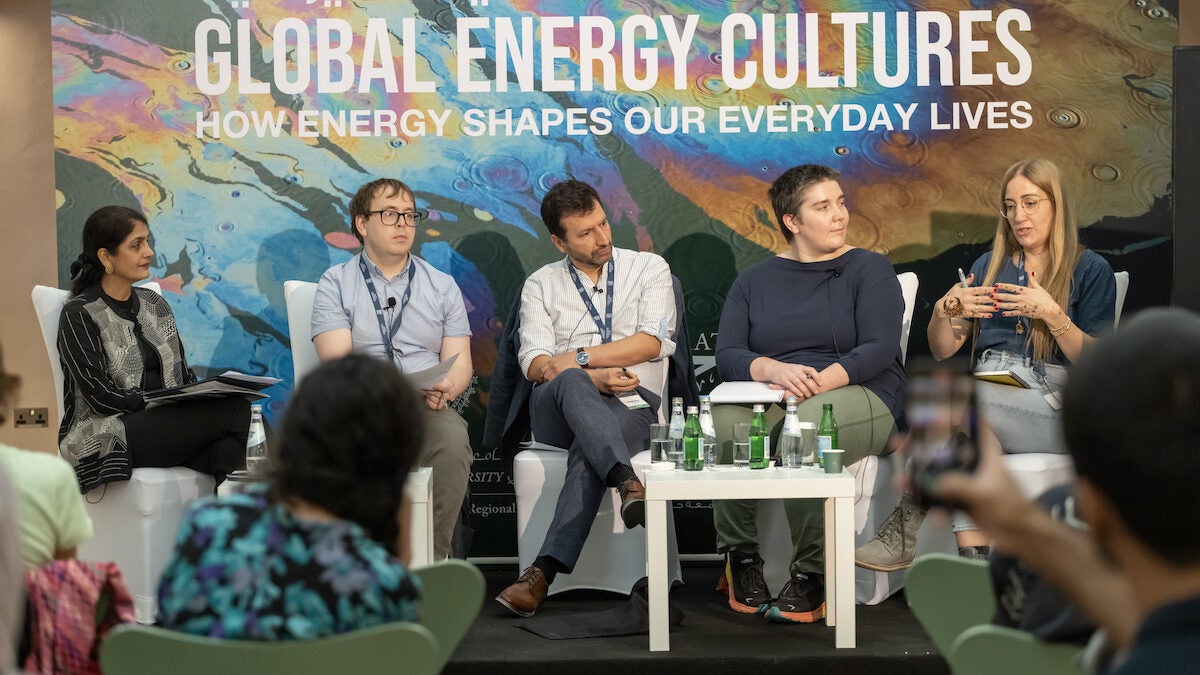
Work and Workers: Towards Energy Justice
This panel, moderated by Zahra Babar, GU-Q, brings workers, particularly fossil feul workers back into the story of energy justice, considering the values and limits of the “just transition” framework, drawing from the history of work to inform contemporary justice efforts.
Panelists:
Ewan Gibbs, University of Glasgow
Peyman Jafari, College of William & Mary
Trish Kahle, GU-Q
Munira Khayyat, New York University Abu Dhabi
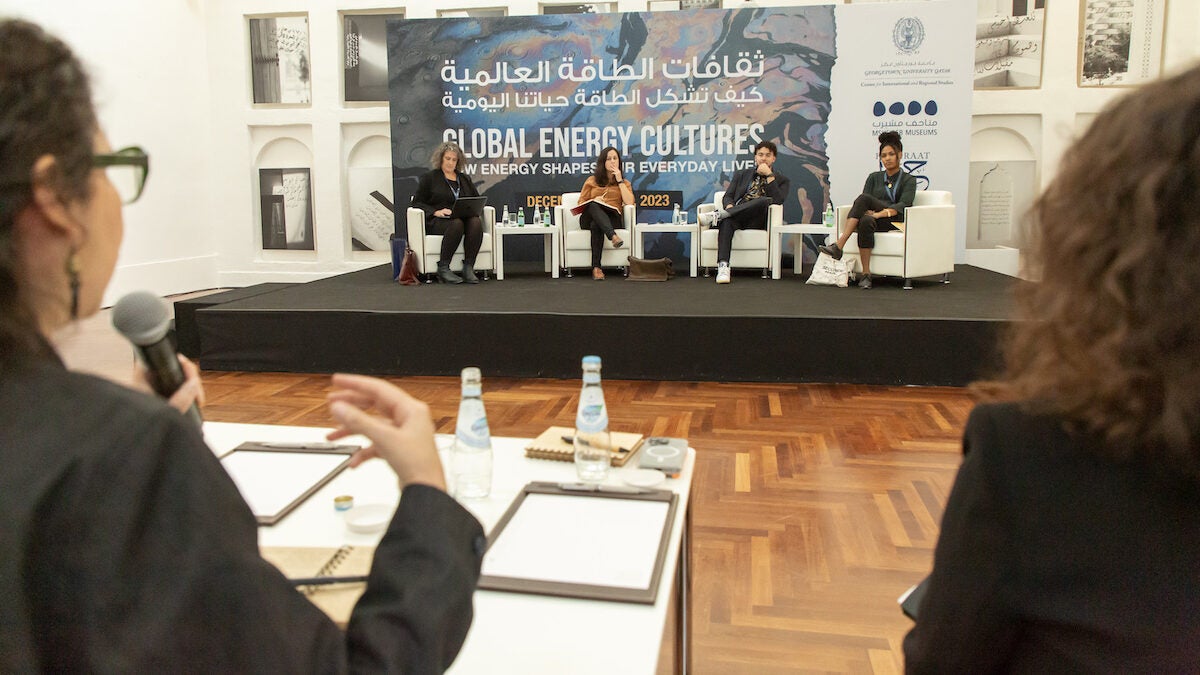
Globalizing the Anthropocene
The story of the Anthropocene is often told from the perspective of the Global North, but this panel moderated by Dana Luciano, Rutgers University, presents the epoch in a richer light, shaped by many different geographic nodes and networks of energy production and use.
Panelists:
Liz Chatterjee, University of Chicago
Ryan Cecil Jobson, University of Chicago
Brittany Meché, Williams College
Msheireb Tours
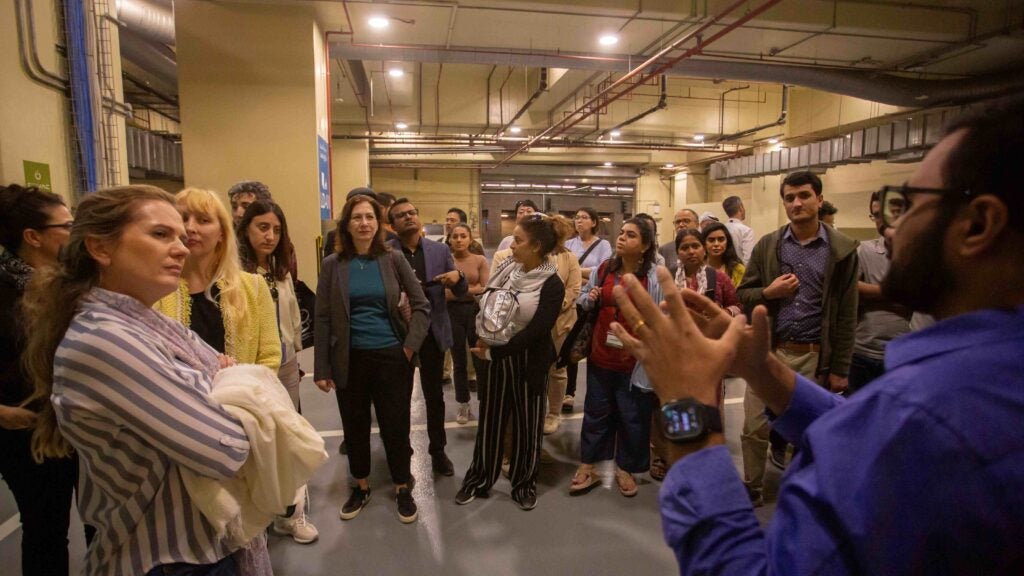
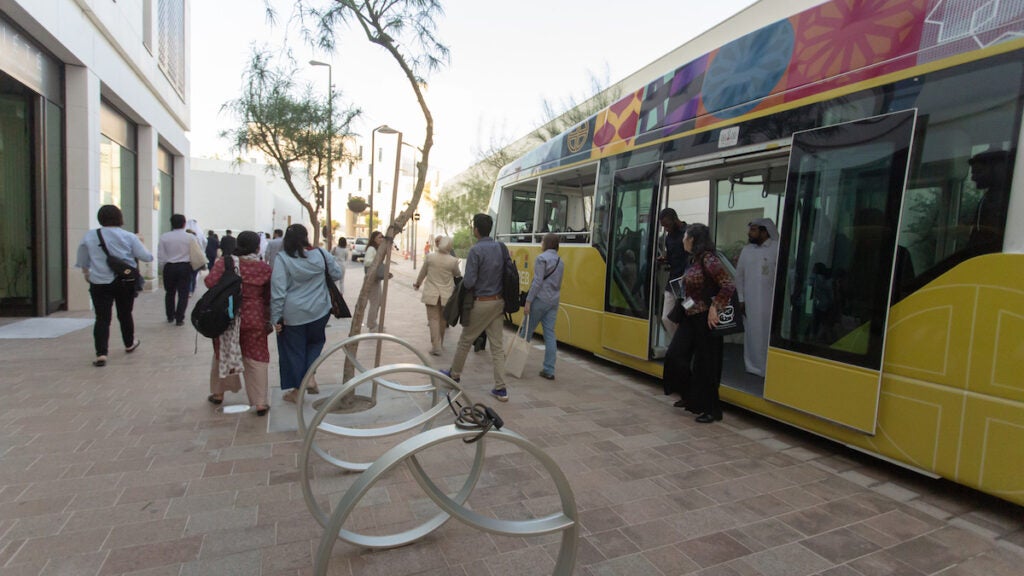
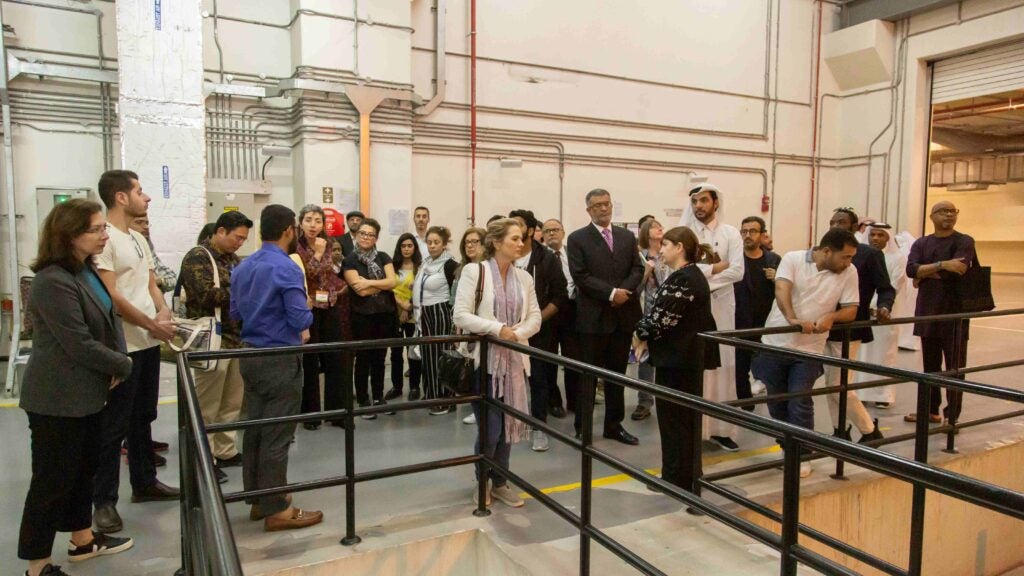
Msheireb Smart City
“What Constitutes a Smart City?” offered a behind-the-scenes glipse of the smart city elements and infrastructure within Msheireb Downtown Doha both above and below ground.
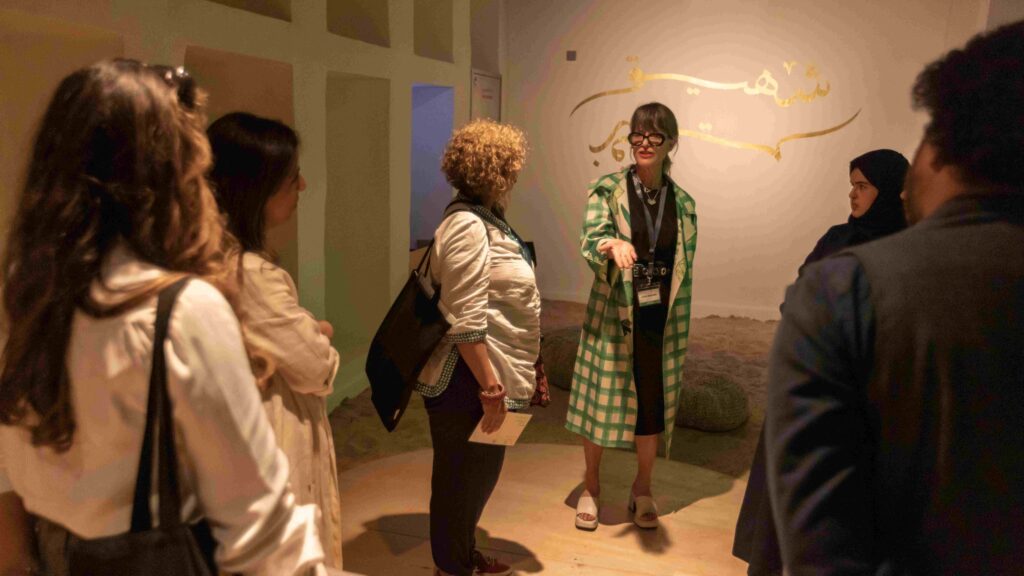
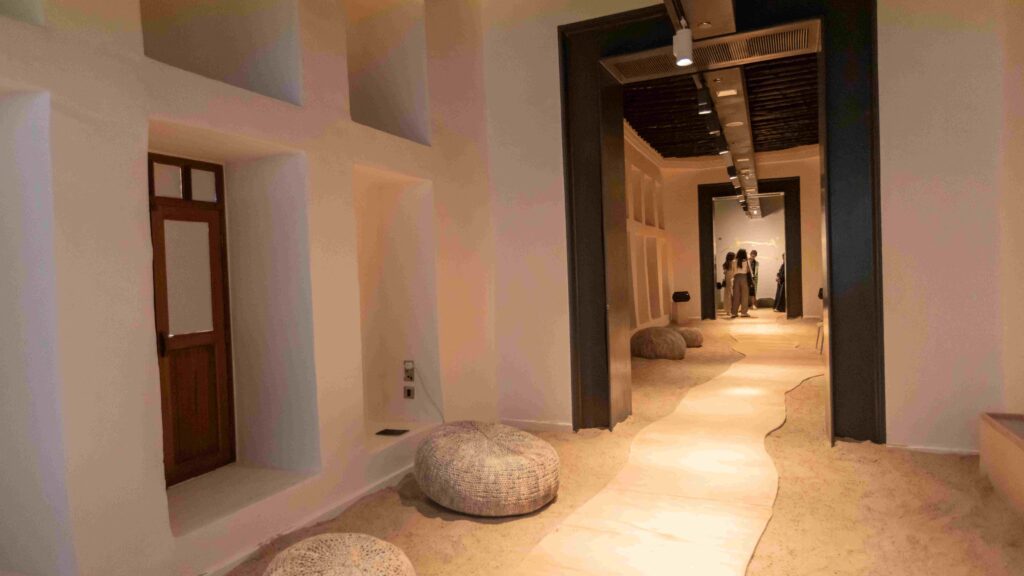
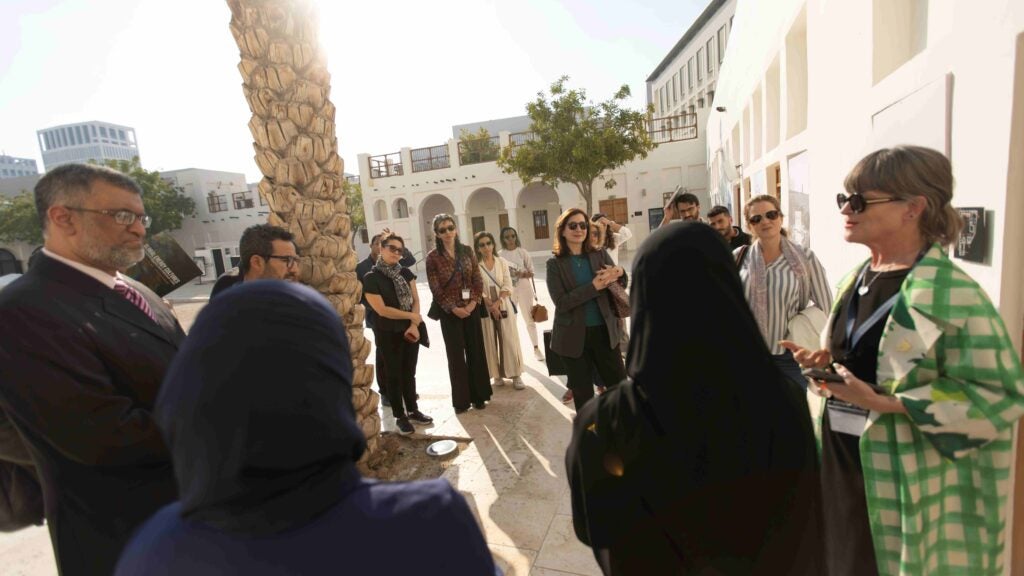
Mapping Migration Memories
Guided by Sara AlNaimi, VCUarts Qatar, this exhibition tour explored an exhibition from the multi-year research project Mapping Migration Memories that collects memories and oral histories of the biannual Qatari migrations. This project, headed by Astrid Kensinger, is part of VCUarts Qatar’s (IN)>TANGIBLE_LAB.
Decolonizing Energy: Palestine and Beyond
This plenary discussion, moderated by Sami Hermez, Northwestern Qatar, addresses the colonial legacies of the spatial and historical development of energy systems in the Global South while foregrounding ecopolitical visions of “taking back power” and making energy justice an essential element of the decolonial project.
Panelists
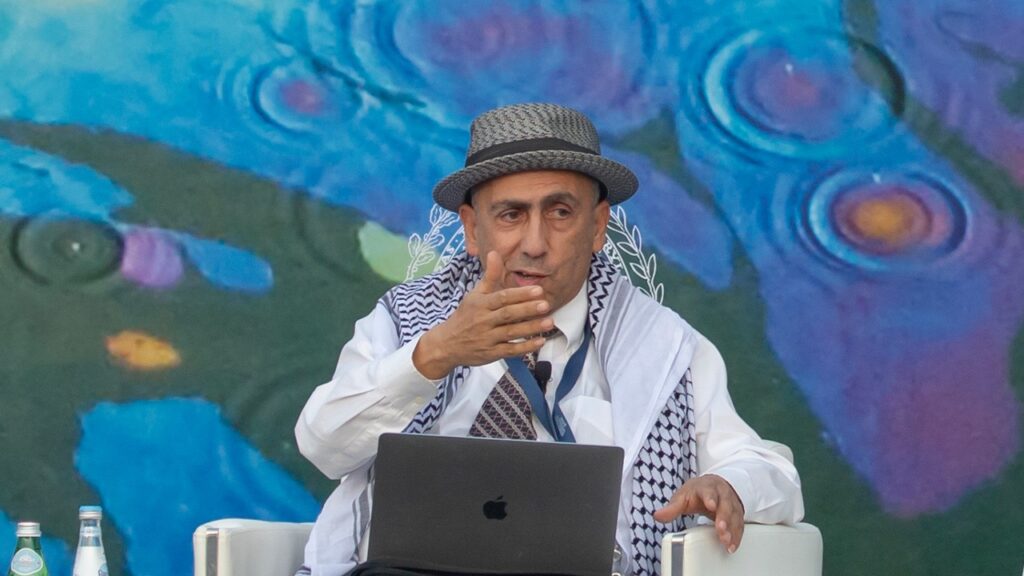
Mazin Qumsiyeh, Palestine Natural History Museum
“The world is not very complicated. They try to make the world complicated for us, but it’s really about one word, which is greed. There are some people who are interested in gathering it all and denying millions of people basic living conditions…And what you see is a devastating impact on the environment of colonization and of oppression, and of this greed.”
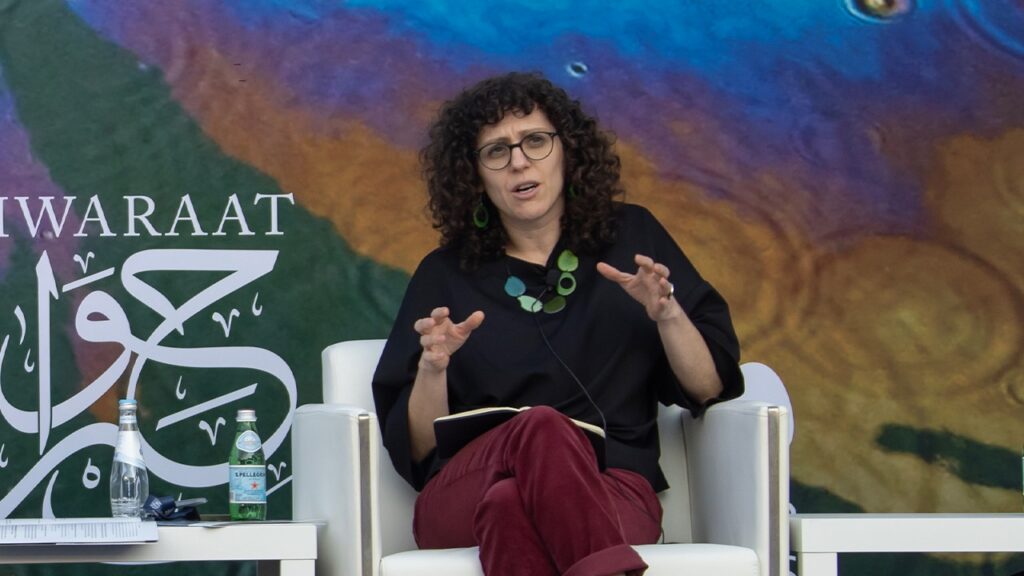
Muna Dajani, London School of Economics and Political Science, UK
“I think there has been a big gap between that understanding of climate change and how to address it. Usually the solution also by this type of climate activism that is based in the West, it’s all around, market-based mechanisms, it’s all around techno-managerial solutions. It doesn’t really address issues of justice because it is a global issue and framing it as such is giving us all [mistakenly] equal responsibilities for it.”
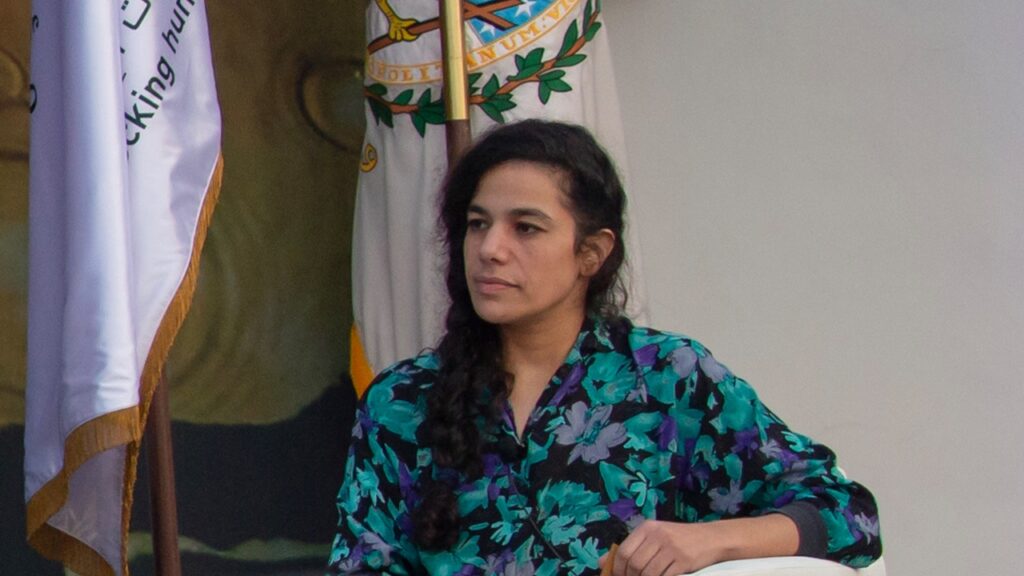
Noura Alkhalili, Radboud Universiteit
“When these renewable energy transitions are being approached or conducted through an Eco- modernist approach… [it is] further empowering these illegal occupations and to destroy fragile ecosystems. So all that is embedded in an enduring colonial environmental narrative that labels land as underdeveloped or misused and it should be grabbed for saving the planet and to create green energy.”
Artist Talk and Music Performance
This performance and artist talk featured University of Alaska scientist Daniel Crawford’s original piece “Planetary Bands, Warming World,” a music composition telling the geographically diverse story of climate change from 1880 to 2015 using scientific data from the U.S. National Aeronautics and Space Administration (NASA), Goddard Institute for Space Studies (GISS) Surface Temperature Analysis, GISSTEMP v4.
“We took the raw temperature measurements of each of these regions and directly translated them to the pitch of each instrument. as you hear the piece, which progresses through time, you’ll hear the pitches gradually rise on each instrument. And you may notice that the first violin, which is performing the Arctic Time series, is rising exceptionally quickly. So our two violin players will each be performing the Arctic band followed by the band directly under it of those other northern latitudes, and then the viola and the cello will respectively perform the temperature time series of the subtropics and of the equatorial region.”
– Daniel Crawford
Qatar Philharmonic Orchestra Doha String Quartet Performers
Lorena Mănescu on violin
Dimitri Torchinsky on violin
Andrea Mereuta on viola
Christoph Schmitz on cello
Musical Program
“Planetary Bands, Warming World,” an original composition, provided a powerful depiction of climate change. The Quartet went on to perform two pieces inspired by unpredictable weather: “Gute Nacht” from Winterreise by Franz Schubert, which was written in 1816, known as the year without a summer following the eruption of Mount Tambora in Indonesia, and “The Storm” portion of the Four Seasons by Antonio Vivaldi, which depicts a surprise hail storm in the summer.
Closing Remarks
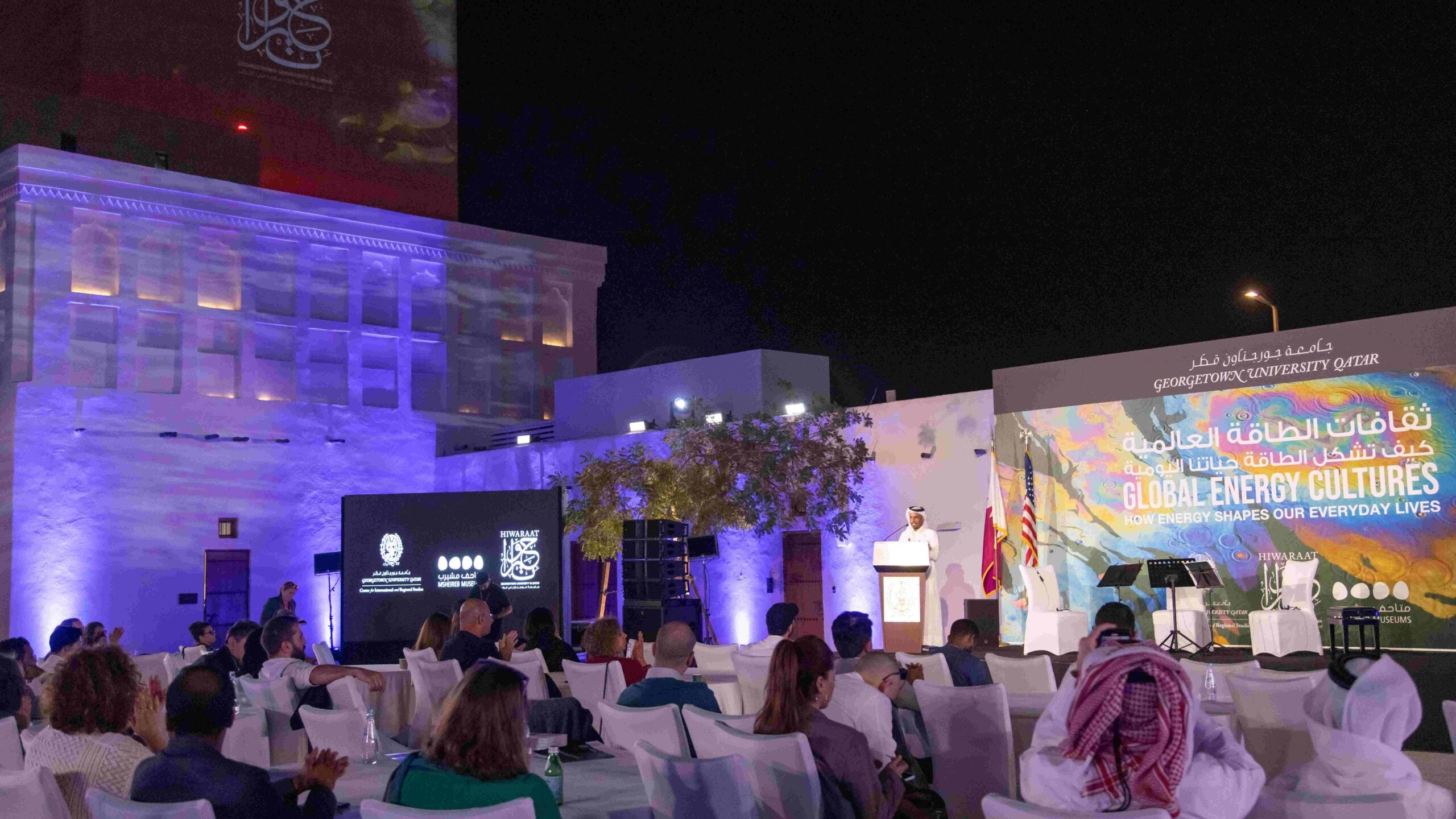
Abdullah Al Naama, Acting General Manager, Msheireb Museums
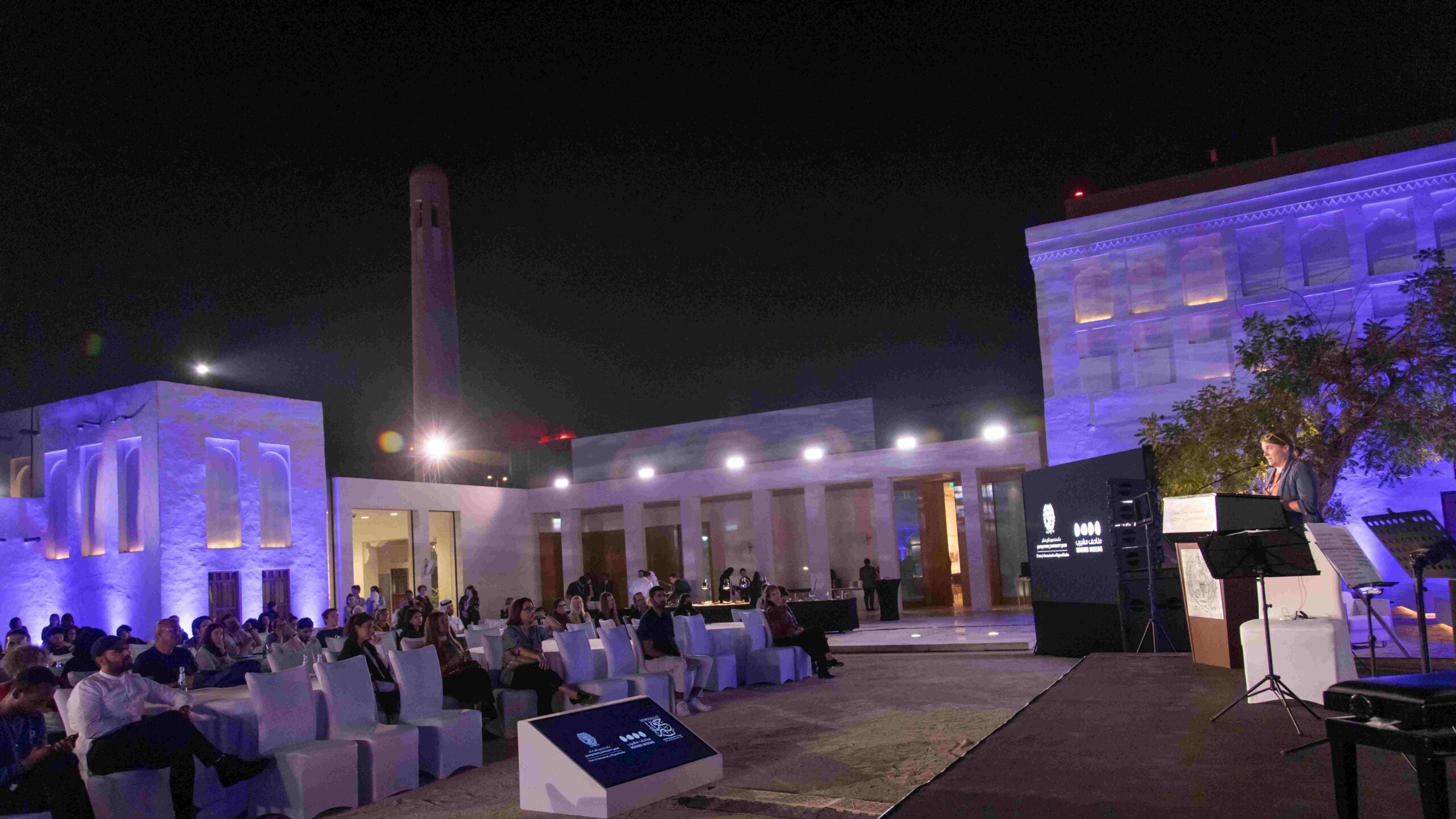
Victoria Googasian, GU-Q
Conference Organizers
Center for International and Regional Studies
Emerging out of the Energy Humanities initiative at GU-Q’s Center for International and Regional Studies, this conference was organized by CIRS staff and faculty project leads, including Victoria Googasian, Trish Kahle, and Firat Oruc. The initiative has created a series of podcasts and is developing a publication to be submitted as a journal special issue on Affects of Energy Transition.
“This forum in particular has pushed us way beyond our traditional academic conference, reflecting our long-term commitment to engaging through truly transformative collaboration. The choice of Msheireb heritage houses has added a profound cultural and historical backdrop to our discussions.”
– Zahra Babar, GU-Q
Msheireb Museums
Msheireb Museums collaborated with GU-Q to provide the venue and exhibition space for this event. Acting General Manager of Msheireb Museums Abdullah Al Naama gave the opening and closing remarks, and Dr. Hafiz Ali Abdullah, Senior Director Corporate Communications, Msheireb Properties spoke at a panel on Heritage Spaces and Energy Futures.
“Msheireb Downtown Doha was designed to exist in harmony with the local environment…We used traditional wisdom in combination with modern technology to create a model for what the city of the future should be.”
– Dr. Hafiz Ali Abdullah
